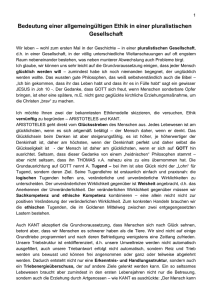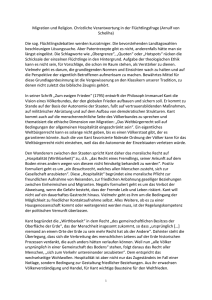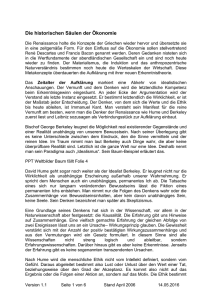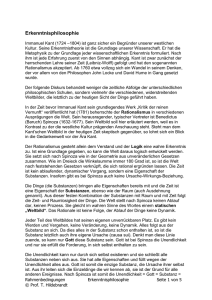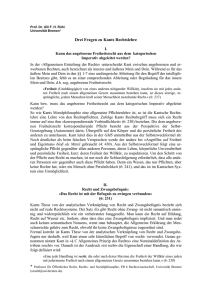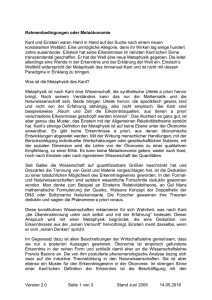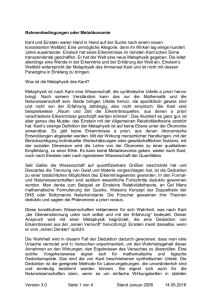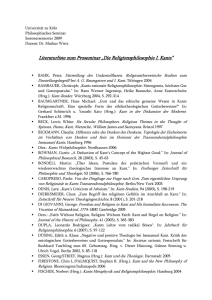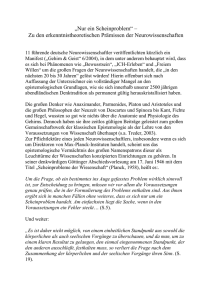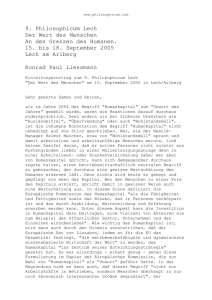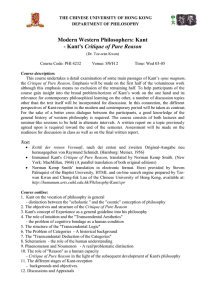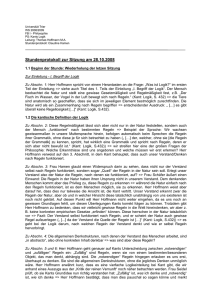Crampe-Casnabet, Michele - North American Kant Society
Werbung
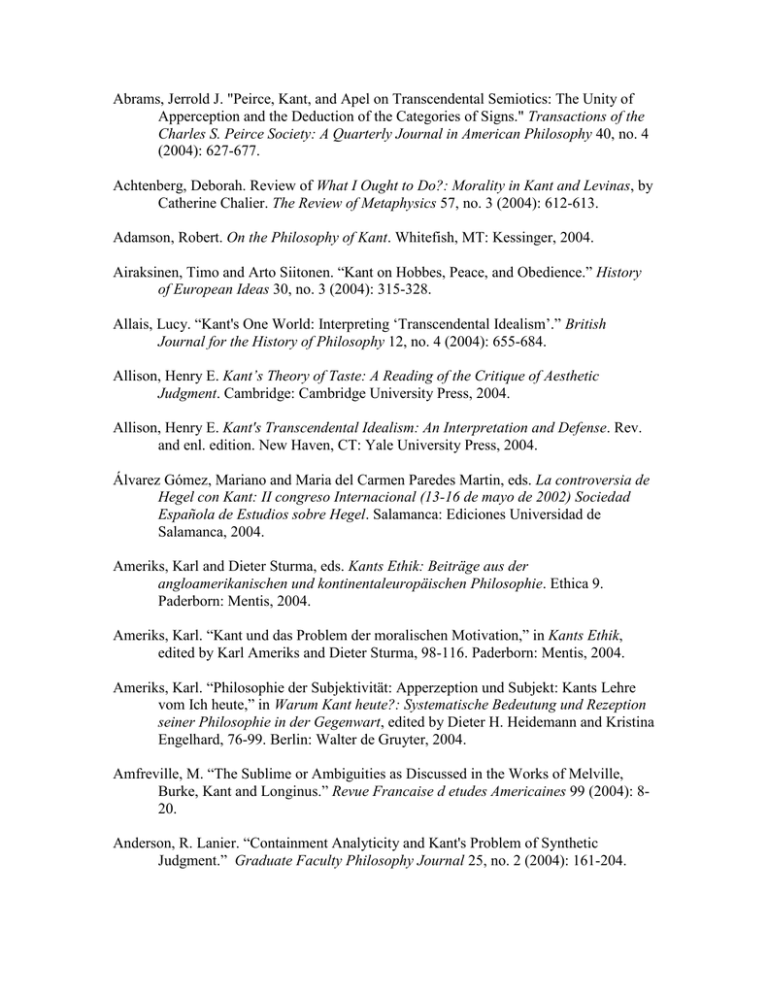
Abrams, Jerrold J. "Peirce, Kant, and Apel on Transcendental Semiotics: The Unity of Apperception and the Deduction of the Categories of Signs." Transactions of the Charles S. Peirce Society: A Quarterly Journal in American Philosophy 40, no. 4 (2004): 627-677. Achtenberg, Deborah. Review of What I Ought to Do?: Morality in Kant and Levinas, by Catherine Chalier. The Review of Metaphysics 57, no. 3 (2004): 612-613. Adamson, Robert. On the Philosophy of Kant. Whitefish, MT: Kessinger, 2004. Airaksinen, Timo and Arto Siitonen. “Kant on Hobbes, Peace, and Obedience.” History of European Ideas 30, no. 3 (2004): 315-328. Allais, Lucy. “Kant's One World: Interpreting ‘Transcendental Idealism’.” British Journal for the History of Philosophy 12, no. 4 (2004): 655-684. Allison, Henry E. Kant’s Theory of Taste: A Reading of the Critique of Aesthetic Judgment. Cambridge: Cambridge University Press, 2004. Allison, Henry E. Kant's Transcendental Idealism: An Interpretation and Defense. Rev. and enl. edition. New Haven, CT: Yale University Press, 2004. Álvarez Gómez, Mariano and Maria del Carmen Paredes Martin, eds. La controversia de Hegel con Kant: II congreso Internacional (13-16 de mayo de 2002) Sociedad Española de Estudios sobre Hegel. Salamanca: Ediciones Universidad de Salamanca, 2004. Ameriks, Karl and Dieter Sturma, eds. Kants Ethik: Beiträge aus der angloamerikanischen und kontinentaleuropäischen Philosophie. Ethica 9. Paderborn: Mentis, 2004. Ameriks, Karl. “Kant und das Problem der moralischen Motivation,” in Kants Ethik, edited by Karl Ameriks and Dieter Sturma, 98-116. Paderborn: Mentis, 2004. Ameriks, Karl. “Philosophie der Subjektivität: Apperzeption und Subjekt: Kants Lehre vom Ich heute,” in Warum Kant heute?: Systematische Bedeutung und Rezeption seiner Philosophie in der Gegenwart, edited by Dieter H. Heidemann and Kristina Engelhard, 76-99. Berlin: Walter de Gruyter, 2004. Amfreville, M. “The Sublime or Ambiguities as Discussed in the Works of Melville, Burke, Kant and Longinus.” Revue Francaise d etudes Americaines 99 (2004): 820. Anderson, R. Lanier. “Containment Analyticity and Kant's Problem of Synthetic Judgment.” Graduate Faculty Philosophy Journal 25, no. 2 (2004): 161-204. Anderson, R. Lanier. “It Adds Up After All: Kant's Philosophy of Arithmetic in Light of the Traditional Logic.” Philosophy and Phenomenological Research 69, no. 3 (2004): 501-540. Anderson-Gold, Sharon, "Cosmopolitan Right - Kant's Key to Perpetual Peace”. Filozofski Godisnjak 17, ( 2004): 148-156 Anderson-Gold, Sharon . “Evil and Enlightenment in the Philosophy of Immanuel Kant”, in Recht-Geschichte-Religion: Die Bedeutung fur die Gegenwart, edited by Herta NaglDocekal and Rudolf Langthaler, Berlin: Akademie Verlag GmbH, 2004 Andrew, Edward. Review of Transcritique: On Kant and Marx, by Kojin Karatani. Review of Politics 66, no. 4 (2004): 687-690. Angehrn, Emil. “Geschichtsphilosophie: Kant und die gegenwärtige Geschichtsphilosophie,” in Warum Kant heute?: Systematische Bedeutung und Rezeption seiner Philosophie in der Gegenwart, edited by Dieter H. Heidemann, 328-351. Berlin: Walter de Gruyter, 2004. Angeli, Oliviero. Volk und Nation als "Zukunftsbegriffe": politische Leitbilder im begriffsgeschichtlichen Kontext der Aufklärung. Region, Nation, Europa 21. Münster: LIT, 2004. Aparecida-Martins, Clelia. “O conceito de sujeito em Kant.” Veritas 50, no. 2 (2004): 195-204. Apel, Karl Otto. “Kant, Hegel, and the Contemporary Question Concerning the Normative Foundations of Morality and Right,” in Hegel on Ethics and Politics, edited by Robert B. Pippin, 49-77. Cambridge: Cambridge University Press, 2004. Aquila, Richard E.. Review of Interpreting Kant’s Critiques, by Karl Ameriks. International Philosophical Quarterly 44, no. 4 (2004): 591-593. Aquila, Richard E. “The Singularity and the Unity of Transcendental Consciousness in Kant.” History of European Ideas 30, no. 3 (2004): 349-376. Archibugi, D. “Cosmopolitan Democracy and its Critics: A Review.” European Journal of International Relations 10, no. 3 (2004): 437-473. Arp, R. “Husserl and the Penetrability of the Transcendental and Mundane Spheres.” Human Studies 27, no. 3 (2004): 221-239. Audi, Robert. “Reasons, Practical Reason, and Practical Reasoning.” Ratio 17, no. 2 (2004): 119-149. Audi, Robert. The Good in the Right: A Theory of Intuition and Intrinsic Value. Princeton, NJ: Princeton University Press, 2004. Bahr, Petra. Darstellung des Undarstellbaren: Religionstheoretische Studien zum Darstellungsbegriff bei A.G. Baumgarten und I. Kant. Tübingen: Mohr Siebeck, 2004. Banham, Gary. Review of Kant’s Transcendental Idealism: An Interpretation and Defense, by Henry E. Allison. Cithara 44, no. 1 (2004): 68-69. Baranzke, Heike. “Does Beast Suffering Count for Kant: A Contextual Examination of Section 17 in The Doctrine of Virtue.” Essays in Philosophy 5, no. 2 (2004): 1-18. Bard, Xavier. Kant et "la folie religieuse.” Rouillon: Edition Dauphine, 2004. Bardon, Adrian. “Kant's Empiricism in His Refutation of Idealism.” Kantian Review 8 (2004): 62-88. Barnett, S. Review of Between Kant and Hegel: Lectures on German Idealism, by Dieter Henrich. CHOICE 41, no. 9 (2004): 1676. Baron, Marcia. “Handeln aus Pflicht,” in Kants Ethik, edited by Karl Ameriks, 80-97. Paderborn: Mentis, 2004. Barth, Roderich. Absolute Wahrheit und endliches Wahrheitsbewusstsein: Das Verhältnis von logischem und theologischem Wahrheitsbegriff - Thomas von Aquin, Kant, Fichte und Frege. Tübingen: Mohr Siebeck, 2004. Barthelemy, J. H. “Husserl and the Auto-transcendence of Meaning.” Revue Philosophique de la France et de l Etranger 129, no. 2 (2004): 181-197. Bartra, Roger. El duelo de los ángeles: locura sublime, tedio y melancolía en el pensamiento moderno. Valencia: Editorial Pre-Textos, 2004. Bartuschat, Wolfgang. “Kant über Grundsatz und Grundsätze in der Moral.” Jahrbuch für Recht und Ethik 12 (2004): 283-298. Baulch, David M. “The ‘Perpetual Exercise of an Interminable Quest’: The Biographia Literaria and the Kantian Revolution.” Studies in Romanticism 43, no. 4 (2004): 557-81. Baumanns, Peter. Kant und die Bioethik. Würzburg: Königshausen & Neumann, 2004. Baynes, Kenneth. “The Transcendental Turn: Habermas's 'Kantian Pragmatism,” in The Cambridge Companion to Critical Theory, edited by Fred Rush, 194-218. Cambridge: Cambridge University Press, 2004. Baz, A. “What’s the Point of Calling out Beauty?” British Journal of Aesthetics 44, no. 1 (2004): 57-72. Beck, Heinrich. Dimensionen der Wirklichkeit. Argumente zur Ontologie und Metaphysik. Frankfurt: Peter Lang, 2004. Bellinger, Charles. Review of Religion and Violence: Philosophical Perspectives from Kant to Derrida, by Hent de Vries. Journal of the American Academy of Religion 72 (2004): 247-249. Berger, Maxi. “Kunst und Gesellschaft: Zur materialistischen Implikation des Verhaltnisses von asthetischer Urteilskraft und Vernunft bei Kant und Hegel,” in Glauben und Wissen, Zweiter Teil Hegel Jahrbuch 2004, edited by Andreas Arndt, 25-30. Berlin: Akademie, 2004. Bertman, Martin. “Hobbes and Hume in Relation to Kant.” History of European Ideas 30, no. 3 (2004): 295-314. Betancourt, William D. “El sentido de la "ilustracion" para Kant.” Praxis Filosofica 18 (2004): 5-37. Betz, John R. “Enlightenment Revisited: Hamann as the First and Best Critic of Kant's Philosophy.” Modern Theology 20, no. 2 (2004): 291-301. Bianco, Bruno. “Sistema e teleologia del sapere: L'attualita inattuale del concetto kantiano di scienza,” in Eredita kantiane (1804-2004): Questioni emergenti e problemi irrisolti, edited by Cinzia Ferrini, 41-70. Napoli: Bibliopolis, 2004. Bielefeldt, Heiner. Symbolic Representation in Kant’s Practical Philosophy. Cambridge: Cambridge University Press, 2004. Bilodeau, M. and N. Gravel. “Voluntary Provision of a Public good and Individual Morality.” Journal of Public Economics 88, no. 3-4 (2004): 645-666. Bird, Graham. “Kant’s Empirical Realism.” European Journal of Philosophy 12, no. 1 (2004): 127-131. Bird, R. “Minding the Gap: Detachment and Understanding in Aleksj Losev’s Dialektika.” Studies in Eastern European Thought 56, no. 2-3 (2004): 143-160. Blattner, William. “Heidegger’s Kantian Idealism Revisited.” Inquiry 47, no. 4 (2004): 321-337. 4 Boboc, Alexandru. “Societatea Kant.” Revista de Filosofie 51 (2004): 521-522. Bodea, Marcel. “Espaces mathematiques et l’espace kantien en tant que forme de l’intuition pure [Intuition de la ‘connexion’].” Studia Universitatis Babes-Bolyai (Philosophia) 49 (2004): 33-42. Böhmer, Otto A. Als der Mensch Mensch war: Radio-Biografien zu Kant, Herder, Novalis. Leipzig: HörZeichen HörBuch, 2004. Bonaunet, Ketil. Hermann Cohen's Kantian Philosophy. Bern: Peter Lang, 2004. Bonfiglio, Thomas. Review of Narrating Community after Kant: Schiller, Goethe, and Holderlin, by Karin Schutjer. German Studies Review 27 (2004): 150-151. Borges, Maria de Lourdes. “What Can Kant Teach Us about Emotions?” Journal of Philosophy 101, no. 3 (2004): 140-158. Bossinade, J. “Ethics and Psychoanalysis.” Psyche 58, no. 7 (2004): 608-633. Botul, Jean-Baptiste. La vida sexual de Immanuel Kant. Translated by Juan Francisco Magías. Madrid: Arena Libros, 2004. Bouchard, Yves. Le holisme épistémologique de Kant. Montreal: Bellarmin, 2004. Boulter, S. J. “Metaphysical Realism as a Pre-Condition of Visual Perception.” Biology & Philosophy 19, no. 2 (2004): 243-261. Boundas, C. “The Art of Begetting Monsters: The Unnatural Nupitals of Deleuze and Kant,” in Recent Continental Thought and Classical Modern Philosophy, edited by S. H. Daniel, 254-280. Evanston, IL: Northwestern University Press, 2004. Bowen, S. A. “Organizational Factors Encouraging Ethical Decision Making: An Exploration into the Cause of an Exemplar.” The Journal of Business Ethics 52, no. 4 (2004): 311-324. Boyer, Alain. Kant et Epicure: le corps, l'âme, l'esprit. Paris: Presses Universitaires de France, 2004. Brandt, Reinhard. “Kants Ehe- und Kindesrecht.” Deutsche Zeitschrift für Philosophie 52, no. 2 (2004): 199-219. Brandt, Reinhard. “Nochmals: Kants Philosophie der Klugheit,” in Eredita kantiane (1804-2004): Questioni emergenti e problemi irrisolti, edited by Cinzia Ferrini, 357-388. Napoli: Bibliopolis, 2004. 5 Brankel, Jürgen. Kant et la faculté de juger. Paris: l’Harmattan, 2004. Breitenbach, Angela. “Langton on Things in Themselves: A Critique of Kantian Humility.” Studies in History and Philosophy of Science 35A, no. 1 (2004): 137148. Briey, Laurent de. Review of Comprendre Kant, by Olivier Dekens. Revue Philosophique de Louvain 102, no. 4 (2004): 660-663. Brinkmann, Klaus. Revie of Kant and the Fate of Autonomy by Karl Ameriks. The Review of Metaphysics 57, no. 4 (2004): 824-826. Brogan, Harold W. “Kant's Retrieval of Leibniz: A Transcendental Account of Teleological Thinking.” Epoche 8, no. 2 (2004): 271-284. Brook, Andrew. “Kant, Cognitive Science and Contemporary Neo-Kantianism.” Journal of Consciousness Studies 11 (2004): 1-25. Brown, Steven Ravett. “On the Mechanism of the Generation of Aesthetic Ideas in Kant's Critique of Judgment.” British Journal for the History of Philosophy 12, no. 3 (2004): 487-499. Bubner, Rüdiger. Kant 2004 - Jenseits der Selbstverständlichkeiten. Heidelberg: C F Müller, 2004. Burnham, Douglas. “Immortality and Finitude: Kant's Moral Argument Reconsidered,” in Death and Anti-Death, Volume 2: Two Hundred Years after Kant, Fifty Years after Turing, edited by Charles Tandy, 277-300. Palo Alto, CA: Ria University Press, 2004. Burnham, Douglas. Kant's Philosophies of Judgement. Edinburgh: Edinburgh University Press, 2004. Buroker, Jill Vance. Review of Kant’s Theory of A Priori Knowledge, by Robert Greenberg. Dialogue: Canadian Philosophical Review 43 (2004): 165-167. Byrne, Peter. “Freedom and Anthropology in Kant's Moral Philosophy.” Religious Studies 40, no. 2 (2004): 247-248. Capeilleres, F. Kant Philosophie. Paris: Le Cerf, 2004. Caranti, Luigi. Kant e lo scetticism. Lungro di Cosenza: Marco, 2004. 6 Caranti, Luigi. “The Problem of Idealism in Kant's Pre-Critical Period.” Kant Studien 95, no. 3 (2004): 283-303. Carid, Edward. A Critical Account of the Philosophy of Kant with an Historical Introduction. 1889. Reprint, Kessinger, 2004. Carpi, Orlando. Kant: i problemi della metafisica. Rimini: Panozzo, 2004. Carson, Emily. “Metaphysics, Mathematics and the Distinction between the Sensible and the Intelligible in Kant's Inaugural Dissertation.” Journal of the History of Philosophy 42, no. 2 (2004):165-194. Casini, Paolo. “Kant e la rivoluzione newtoniana.” Rivista di Filosofia 95, no. 3 (2004): 377-417. Cassirer, H. W. Kant’s First Critique: An Appraisal of the Permanent Significance of Kant’s Critique of Pure Reason. Oxford: Routledge, 2004. Castillo, Monique. Criticisme et religion: journées d'échanges. Paris: l’Harmattan, 2004. Cattaneo, M. A. “Menschenwurde bei Kant.” ARSP Beiheft no. 101 (2004): 24-32. Caygill, H. “Late Kant: Towards Another Law of the Earth.” Radical Philosophy 126 (2004): 53. Cazeaux, Clive. “Kant and Metaphor in Contemporary Aesthetics.” Kantian Review 8 (2004): 1-37. Cederman, L. E. and K. S. Gleditsch. “Conquest and Regime Change: An Evolutionary Model of the Spread of Democracy and Peace.” International Studies Quarterly 48, no. 3 (2004): 603-629. Celmare, Stefan. “Empirismul logic si distinctia kantiana analitic-sintetic (Logical Empericism and the Kantian Distinction Analytic-Synthetic).” Symposion 2, no. 2 (2004): 337-344. Cernica, Viorel. Proiectele filosofiei kantiene (The Projects of Kantian Philosophy). Iasi: Institutul European, 2004. Chackalackal, Saju. "Kant's Quest for Unity: An Open Project in the Human Community." Angelicum: Periodicum Trimestre Pontificiae Studiorum Universitatis a Sancto Thoma Aquinate in Urbe 81, no. 4 (2004): 745-79. 7 Chandler, D. R. Review of The God Within: Kant, Schelling and Historicity by Emil Fackenheim and John W. Burbidge. Religious Humanism 37 (2004): 85-86. Cheah, Pheng. Spectral Nationality: Passages of Freedom from Kant to Postcolonial Literatures of Liberation. New York: Columbia University Press, 2004. Cherkasova, Evgenia V. “Kant on Free Will and Arbitrariness: A View from Dostoevsky's Underground.” Philosophy and Literature 28, no. 2 (2004): 367378. Chindea, Gabriel. “Kant et le probleme de l’intelligible.” Studia Universitatis BabesBolyai (Philosophia) 49 (2004): 3-12. Choi, Seung-Whan and Patrick James. “Civil-Military Relations in a Neo-Kantian World, 1886-1992.” Armed Forces & Society: An Interdisciplinary Journal 30, no. 2 (2004): 227-254. Clark, Philip. “Kantian Morals and Humean Motives.” Philosophy and Phenomenological Research 68, no. 1 (2004): 109-126. Clark, Michael. “A Non-Retributive Kantian Approach to Punishment.” Ratio Juris 17, no. 1 (2004): 12-27. Cohen-Halimi, Michèle. Entendre raison: essai sur la philosophie pratique de Kant. Paris: J. Vrin, 2004. Connelly, James. Review of Justice and Nature: Kantian Philosophy, Environmental Policy and the Law, by John Martin Gillroy. Environmental Politics 13, no. 3 (2004): 664-665. Corazón González, Rafael. Kant y la Ilustración. Madrid: Rialp, 2004. Couturat, Louis. La philosophie des mathématiques de Kant. Houilles: Manucius, 2004. Crampe-Casnabet, Michèle. Kant, le gouvernement de la raison. Philosophie Présente Paris: Bordas, 2004. Crisan, Horatiu. “Arendt sur Kant: la troisieme Critique et ses implications politiques.” Studia Universitatis Babes-Bolyai (Philosophia) 49 (2004): 53-60. Croitoru, Rodica. “Colocviul ‘Kant si Fanta’ (The Conference ‘Kant and France’).” Revista de Filosofie 51, no. 3-4 (2004): 526-529. Cuypers, S. E. “Critical Thinking, Autonomy and Practical Reason.” Journal of 8 Philosophy of Education 38, no. 1 (2004): 75-90. Dahlstrom, Daniel O. “Phanomenologie: Kant und die gegenwärtige Phanomenologie,” in Warum Kant heute?: Systematische Bedeutung und Rezeption seiner Philosophie in der Gegenwart, edited by Dieter H. Heidemann, 100-125. Berlin: Walter de Gruyter, 2004. Dammann, Guy. Review of The Ideas of Form: Rethinking Kant’s Aesthetics, by Roldophe Gasche. The British Journal of Aesthetics 44, no. 3 (2004): 313-315. Darge, R. “First Philosophy as Scientia-transcendens According to Duns Scotus: The Science of Being or ‘Onto-logic’?” Philosophisches Jahrbuch 111, no. 1 (2004): 43-61. Davies, Daniel. Review of Kant, Art, and Art History: Moments of Discipline, by Mark Cheetham. The British Journal of Aesthetics 44 (2004): 96-100. De Quincey, Thomas. Los últimos dias de Emmanuel Kant. 2nd edition. Translated by José Rafael Hernández Arias. Madrid: Valdemar, 2004. De Quincey, Thomas. Les Derniers jours d’Emmanuel Kant. Paris: Allia, 2004. Dekens, Olivier. Le devoir de justice. Paris: Colin, 2004. Delannoy, Benjamin. Burke et Kant: interprètes de la Révolution française. Paris: l'Harmattan, 2004. Deleuze, Gilles. La Philosophie Critique de Kant. Paris: PUF, 2004. Denis, Laura. Review of Symbolic Representation in Kant’s Practical Philosophy, by Heiner Bielefeldt. Ethics 114, no. 4 (2004): 859-860. Derrida, Jacques and Patricio Peñalver. Acabados seguido de: Kant, el judío, el alemán. Madrid: Trotta, 2004. Deschepper, Jean-Pierre. Review of Kant et Epicure, by Alain Boyer. Revue Philosophique de Louvain 102, no. 4 (2004): 695. Deudney, Daniel. “Publius before Kant: Federal-Republican Security and Democratic Peace.” European Journal of International Relations 10, no. 3 (2004): 315-356. Dicker, Georges. Kant's Theory of Knowledge: An Analytical Introduction. Oxford: Oxford University Press, 2004. 9 Dietzsch, Steffen. Immanuel Kant: eine Biographie. 2nd edition. Leipzig: Reclam, 2004. Dillon, Robin S. “Kant on Arrogance and Self-Respect," in Setting the Moral Compass: Essays by Women Philosophers, edited by Cheshire Calhoun, 191-216. Oxford: Oxford University Press, 2004. Dimock, Wai Chee. "Aesthetics at the Limits of the Nation: Kant, Pound, and the Saturday Review." American Literature: A Journal of Literary History, Criticism, and Bibliography 76, no. 3 (2004): 525-547. Dirschauer, Stephane. “La theorie kantienne de l'auto-affection.” Kant Studien 95, no. 1 (2004): 53-85. Domagala, Edward. "I. Kant e M. Scheler: Dalle Premesse Fenomenologico-Exiologiche Alla Critica Del Formalismo Etico." Angelicum: Periodicum Trimestre Pontificiae Studiorum Universitatis a Sancto Thoma Aquinate in Urbe 81, no. 4 (2004): 733-43. Döring, Eberhard. Immanuel Kant: Einführung in sein Werk. Wiesbaden: Marix, 2004. Downard, Jeffrey. “Nietzsche and Kant on the Pure Impulse to Truth.” Journal of Nietzsche Studies 27 (2004): 18-41. Doyé, Sabine, Marion Heinz, and Udo Rameil, eds. Metaphysik und Kritik: Festschrift für Manfred Baum zum 65. Geburtstag. Berlin: Walter de Gruyter, 2004. Doyle, Tsarina. Review of Nietzsche’s Critiques: The Kantian Foundations of His Thought, by R. Kevin. International Philosophical Quarterly 44, no. 4 (2004): 598-599. Draghici, Virgil. “Some Kantian Concepts in the Semantics of the Possible Worlds.” Studia Universitatis Babes-Bolyai (Philosophia) 49 (2004): 13-22. Durali, Saban Teoman. “At the Two Hundredth Anniversary of His Death Remembering and Reassessing Immanuel Kant's Epoch-Making Achievement in Establishing a New Form of Philosophy-Science System.” Kutadgubilig 5 (2004): 9-19. Düsing, Klaus. “Ethik: Kants Ethik in der Philosophie der Gegenwart,” in Warum Kant heute?: Systematische Bedeutung und Rezeption seiner Philosophie in der Gegenwart, edited by Dieter H. Heidemann, 231-263. Berlin: Walter de Gruyter, 2004. Dyck, Corey. “Spirit Without Lines: Kant’s Attempt to Reconcile the Genius and Society.” Idealistic Studies 34, no. 2 (2004): 151-163. 10 Easley, Eric S. The War over Perpetual Peace: An Exploration into the History of a Foundational International Relations Text. New York: Palgrave Macmillan, 2004. Echeverri, S. “Kant’s Transcendental Philosophy and the Argument of Illusion.” Pensamiento 60, no. 227 (2004): 247-277. Edwards, Jeffrey. “One More Time: Kant's Metaphysics of Nature and the Idea of Transition," in Eredita kantiane (1804-2004): Questioni emergenti e problemi irrisolti, edited by Cinzia Ferrini, 155-188. Napoli: Bibliopolis, 2004. Edwards, Rem B. Review of Religion and Violence: Philosophical Perspectives from Kant to Derrida, by Hent de Vries. The Review of Metaphysics 57, no. 4 (2004): 833-834. Elden, Stuart. Review of Kant: A Biography, by Manfred Kuehn. Heythrop Journal 45, no. 1 (2004): 114-115. Emundts, Dina. Kants Übergangskonzeption im Opus postumum: Zur Rolle des Nachlasswerkes für die Grundlegung der empirischen Physik. Quellen und Studien zur Philosophie 62. Berlin: Walter de Gruyter, 2004. Engel, Eva J. “Mendelssohn contra Kant: Ein frühes Zeugnis der Auseinandersetzung mit Kants Lehre von Zeit und Raum in der Dissertation von 1770.” Kant Studien 95, no. 3 (2004): 269-282. Engelhard, Kristina. “Asthetik: Kant in der Gegenwartsästhetik,” in Warum Kant heute?: Systematische Bedeutung und Rezeption seiner Philosophie in der Gegenwart, edited by Dieter H. Heidemann, 352-382. Berlin: Walter de Gruyter, 2004. Esser, Andrea. Eine Ethik für Endliche: Kants Tugendlehre in der Gegenwart. Spekulation und Erfahrung, Abteilung II. Untersuchungen 53. Stuttgart: Frommann-Holzboog, 2004. Esteves, Julio C. R. “Müsste Kant Thesis und Antithesis der dritten Antinomie der Kritik der reinen Vernunft vereinbaren?” Kant Studien 95, no. 2 (2004): 146-170. Falkenburg, Brigitte. "Experience and Completeness in Physical Knowledge: Variations on a Kantian Theme," in History of the Philosophy of Nature, Volume 7 of Logical Analysis and History of Philosophy, edited by Uwe Meixner and Albert Newen, 153-176. Paderborn: Mentis, 2004. Falkenburg, Brigitte. “Kant's Architectonic Principles for a Metaphysics of Nature,” in 11 Eredita kantiane (1804-2004): Questioni emergenti e problemi irrisolti, edited by Cinzia Ferrini, 127-153. Napoli: Bibliopolis, 2004. Falkenburg, Brigitte. “Naturphilosophie und Wissenschaftstheorie: Kants NaturalismusKritik,” in Warum Kant heute?: Systematische Bedeutung und Rezeption seiner Philosophie in der Gegenwart, edited by Dieter H. Heidemann, 177-206. Berlin: Walter de Gruyter, 2004. Falkenstein, Lorne. Kant’s Intuitionism: A Commentary on the Transcendental Aesthetic. Toronto: University of Toronto Press, 2004. Felten, Gundula. Die Funktion des sensus communis in Kants Theorie des ästhetischen Urteils. Munich: Wilhelm Fink, 2004. Ferdori, Donato. “Felicita qui ed ora: Il concetto kantiano di ‘sommo bene’ dalla Critica della ragion pura alla Religione.” Dianoia 9 (2004): 121-151. Ferguson, Michaele. “Forgetting to be Friends: A Kantian Take on Collective Agency.” Conference papers, annual meeting of the Western Political Science Association, Portland, OR, 2004. Ferraris, Maurizio. Goodbye, Kant!: cosa resta oggi della Critica della ragion pura. Milan: Tascabili Bompiani, 2004. Ferrini, Cinzia, ed. Eredita kantiane (1804-2004): Questioni emergenti e problemi irrisolti. Napoli: Bibliopolis, 2004. Ferrini, Cinzia. “Heavenly Bodies, Crystals and Organisms: The Key Role of Chemical Affinity in Kant's Critical Cosmogony," in Eredita kantiane (1804-2004): Questioni emergenti e problemi irrisolti, edited by Cinzia Ferrini, 277-317. Napoli: Bibliopolis, 2004. Fetscher, Iring. “Politische Philosophie: Grenzen der Aktualität der politischen Philosophie Kants,” in Warum Kant heute?: Systematische Bedeutung und Rezeption seiner Philosophie in der Gegenwart, edited by Dieter H. Heidemann, 286-305. Berlin: Walter de Gruyter, 2004. Fidelman, Uri. “Cognitive and Neuropsychological Basis for Quantum Mechanics, Part I: Quantum-particles as Kantian Ideas.” Kybernetes 33, no. 8 (2004): 1247-1257. Findler, Richard. "Why be Witty?: Fichte and Kant on the Nature of Wit with a View to Wit's Political Ramifications." European Legacy: Toward New Paradigm 9, no. 3 (2004): 331-41. 12 Finlayson, James Gordan. Review of Sublime Failures: The Ethics of Kant and Sade, by David Martyn. Modernism/Modernity 11, no. 3 (2004): 593-596. Fischer, Norbert, ed. Kants Metaphysik und Religionsphilosophie. Kant-Forschungen 15. Hamburg: Felix Meiner, 2004. Fischer-Harriehausen, Hermann. Kant und Spinoza. Berlin: amBEATion – randlage, 2004. Fleming, Patrick. “Kant and Strawson on the Objectivity Thesis.” Idealistic Studies 34, no. 2 (2004): 173-181. Flikschuh, Katrin. “Ist das rechtliche Postulat ein Postulat der reinen praktischen Vernunft? Zum Endzweck der Kantischen Rechtslehre.” Jahrbuch für Recht und Ethik 12 (2004): 299-330. Flynn, E. E. “Living Right: Need and Punishment in Kant and Hegel,” in Social Philosophy Today: Environmental Philosophy as Social Philosophy 19, edited by Cheryl Hughes, 137-154. Charlottesville, VA: Philosophy Documentation Center, 2004. Foresti, Tiziana. “Between Darwin and Kant: Veblen’s Theory of Causality.” International Review of Sociology 14, no. 3 (2004): 399-411. Forst, Rainer. “Moralische Autonomie und Autonomie der Moral: Zu einer Theorie der Normativität nach Kant.” Deutsche Zeitschrift für Philosophie 52, no. 2 (2004): 179-197. Forster, E. “Two Recently Discovered Loose Pages from Kant’s ‘Opus Postumum.’” Kant Studien 95, no. 1 (2004): 21-28. Frank, Manfred. “Fragments of a History of the Theory of Self-Consciousness from Kant to Kierkegaard.” Critical Horizons 5, no. 1 (2004): 53-136. Freyenhagen, Fabian. Review of Kant and Liberal Internationalism: Sovereignty, Justice, and Global Reform, by Antonio Franceschet. International Journal of Philosophical Studies 12, no. 1 (2004): 100-103. Freyenhagen, Fabian. Review of Kant and Modern Political Philosophy, by Katrin Flikschuh. International Journal of Philosophical Studies 12, no. 1 (2004): 100103. Fricke, Christel. “Mündigkeit und Tugend: David Hume, Immanuel Kant und Adam Smith über Dispositionen zu moralischem Handeln und Strategien, sich der 13 moralischen Verpflichtung zu entziehen.” SATS 5, no. 1 (2004): 54-70. Friebe, Cord. “Tropenontologie, Kants Substanz-Kategorie und die Quantenmechanik.” Philosophia Naturalis 41, no. 1 (2004): 117-138. Friedrich, Rainer. Eigentum und Staatsbegründung in Kants Metaphysik der Sitten. Berlin: Walter de Gruyter, 2004. Frierson, Patrick R. Freedom and Anthropology in Kant’s Moral Philosophy. Cambridge: Cambridge University Press, 2004. Fritzman, J. M. Review of Noble in Reason, Infinite in Faculty: Themes and Variations in Kant’s Moral and Religious Philosophy, by A.W. Morre. CHOICE: Current Reviews for Academic Libraries 41, no. 7 (2004): 1311. Fronterotta, F. “The Problem of Intuition: Three Studies on Plato, Kant, Husserl.” Giornale Critico della Filosofia Italiana 24, no. 1 (2004): 123-128. Gaidenko, P. P. “The Transformation of Kantian Theory of Time in Fichte’s Theory of Science: Time as a Productive Ability of Imagination.” Voprosy Filosofii no. 1 (2004): 137-142. García Morente, Manuel. La filosofía de Kant: una introducción a la filosofía. Madrid : Ediciones Cristiandad, 2004. Gattei, Stefano. “Back to Kant’s Sapere aude!” History of the Human Sciences 17, no. 4 (2004): 115-121. Gauthier, J. A. Review of Kant on Causation: on the Fivefold Routes to the Principle of Causation, by Steven M. Bayne. Choice 41, no. 11/12 (2004). Gawlina, Manfred. “Kant, ein Atheist?: Ein Strawson-Schüler liest das ‘Opus postumum.’” Kant Studien 95, no. 2 (2004): 235-237. Geier, Manfred. Kants Welt: Eine Biographie. Reinbek: Rowohlt, 2004. Geismann, Georg. “Kant und ein vermeintes Recht des Embryos.” Kant Studien 95, no. 4 (2004): 443-469. Geismann, Georg. “Peace and War in Kant’s Writings.” Kant Studien 95, no. 1 (2004): 128-129. Ginsborg, Hannah. “Two Kinds of Mechanical Inexplicability in Kant and Aristotle.” Journal of the History of Philosophy 42, no. 1 (2004): 33-65. 14 Girtanner, Christoph. Über das kantische Prinzip für die Naturgeschichte. Edited by Robert Bernasconi. Chicago Distribution Center, 2004. Glenn, Gary Dean. “Words that Sound Alike but Have Different Meanings: Christian ‘Natural Rights’ and Kantian Inspired ‘Human Rights.’” Catholic Social Science Review 9 (2004): 21-28. Gogotishvili, L. A. “A. F. Losev’s Radical Lingua-philosophical Project.” Studies in East European Thought 56, no. 2-3 (2004): 119-142. Goldberg, Nathaniel. Review of Between Truth and Illusion: Kant at the Crossroads of Modernity, by Predrag Cicovacki. The Review of Metaphysics 57, no. 4 (2004): 832-833. Grapotte, Sophie. La conception kantienne de la realite. New York: Olms, 2004. Green, Daniel. “A War on Rogue States and WMDs: Hobbesian, Grotian and Kantian Connotations.” Conference papers, annual meeting of the International Studies Association, Montreal, 2004. Gregory, W.E. Torres. Review of Introduction to German Philosophy: From Kant to Habermas, by Andrew Bowie. CHOICE: Current Reviews for Academic Libraries 41, no. 9 (2004): 1675. Greimann, Dirk. “Ist die Ethik Kants ontologisch unschuldig?” Kant Studien 95, no. 2 (2004): 107-127. Grier, Michelle. Review of Kant: A Biography, by Manfred Kuehn. Mind 113, no. 450 (2004): 365-369. Griffioen, S. “The Finite does not Hinder: Hegel’s Philosophy of Christian Religion Placed Against the Backdrop of Kant’s Theory of the Sublime.” Studies in German Idealism 3 (2004): 111-124. Grimoni, Lorenz and Martina Will, eds. Immanuel Kant: Erkenntnis - Freiheit - Frieden: Katalog zur Ausstellung anlässlich des 200. Todestages am 12. Februar 2004, Museum Stadt Königsberg der Stadtgemeinschaft Königsberg (Pr) im Kultur- und Stadthistorischen Museum Duisburg. Husum: Husum, 2004. Grueso, Delfin Ignacio. “La justicia en Kant y su vigencia.” Praxis Filosofica 19 (2004): 23-39. Grundmann, Thomas. “Transzendentalphilosophie: Was ist eigentlich ein 15 transzendentales Argument,” in Warum Kant heute?: Systematische Bedeutung und Rezeption seiner Philosophie in der Gegenwart, edited by Dieter H. Heidemann, 44-75. Berlin: Walter de Gruyter, 2004. Guibal, F. “The Whole of Reality: Questions on Nature and Reality as Expressed by Eric Weil.” Revue des Sciences Philosophiques et Theologiques 88, no. 1 (2004): 3974. Gulyga, Arsenij. Immanuel Kant: Eine Biographie. Translated by Sigrun Bielfeldt. 2nd edition. Suhrkamp, 2004. Gunderson, Martin. “A Kantian View of Suicide and End-of-Life Treatment.” Journal of Social Philosophy 35, no. 2 (2004): 277-287. Gunzel, Stephan. “‘Unterirdische’ Radikalaufklärung von Kant zu Nietzsche: Ein Beitrag zur philosophischen Archaologie und ihrer Epistemologie,” in Nietzsche: Radikalaufklärer oder radikaler Gegenaufklärer?, Nietzscheforschung Sonderband 2, edited by Reante Reschke, 287-296. Berlin: Akademie, 2004. Guyer, Paul. “If There Might be a God.” Review of Noble in Reason, Infinite in Faculty: Themes and Variations in Kant’s Moral and Religious Philosophy, by A. W. Moore. Times Literary Supplement (10 Sep 2004): 10-11. Guyer, Paul. “Teleologie: Zweck in der Natur: Was ist lebendig und was ist tot in Kants Teleologie?” in Warum Kant heute?: Systematische Bedeutung und Rezeption seiner Philosophie in der Gegenwart, edited by Dieter H. Heidemann, 383-413. Berlin: Walter de Gruyter, 2004. Haase, Marco. Grundnorm - Gemeinwille – Geist: Der Grund des Rechts nach Kelsen, Kant und Hegel. Tübingen: Mohr Siebeck, 2004. Haftel, Yoram. “The Effect of Regional Institutionalization on Violent Conflict: A Wobbly Kantian Leg?” Conference papers, annual meeting of the International Studies Association, Montreal, 2004. Halle, Randall. Queer Social Philosophy: Critical Readings from Kant to Adorno. Champaign, IL: University of Illinois Press, 2004. Hanna, Robert. Kant and the Foundations of Analytic Philosophy. 2nd edition. Oxford: Clarendon Press, 2004. Hardy, Henry. “Crimes Against Kant’s Genius.” Reviews of Critique of Pure Reason, by Immanuel Kant, translated by Norman Kemp Smith; A Commentary to Kant’s Critique of Pure Reason, by Norman Kemp Smith. Times Higher Education Supplement (28 May 2004): 7. 16 Harrison, Ewan. “Kant and Systemic Theory: A Reply to Weber.” Review of International Studies 30, no. 1 (2004): 153-157. Hashi, Hisaki. Die Dynamik von Sein und Nichts: Dimension der vergleichenden Philosophie. Frankfurt: Peter Lang, 2004. Heck, Jose N. “Contratualismo e sumo bem politico: Um estudo preliminar sobre a Pax Kantiana.” Veritas 49, no. 1 (2004): 71-92. Heidemann, Dietmar H. and Kristina Engelhard, eds. Warum Kant heute?: Systematische Bedeutung und Rezeption seiner Philosophie in der Gegenwart. Berlin: Walter de Gruyter, 2004. Heidemann, Dietmar H. “Erkenntnistheorie: Vom Empfinden zum Begreifen: Kant im Kontext der gegenwärtigen Erkenntnistheorie,” in Warum Kant heute?: Systematische Bedeutung und Rezeption seiner Philosophie in der Gegenwart, edited by Dieter H. Heidemann, 14-43. Berlin: Walter de Gruyter, 2004. Heil, Joachim. Über die Notwendigkeit einer Metaphysik der Freiheit: Kurze Einführung in die Praktische Philosophie Immanuel Kants. London: Turnshare, 2004. Heil, Joachim. Wenn die Freiheit ins Denken einfällt: Fremd- und Eigenverantwortlichkeit bei Immanuel Kant und Emmanuel Lévinas. London: Turnshare, 2004. Heinrichs, Johannes. Das Geheimnis der Kategorien: Die Entschlüsselung von Kants zentralem Lehrstück. Berlin: Maas, 2004. Heinze, E. A. “The Moral Limits of Humanitarian Intervention: Reconciliation Human Respect and Utility.” Polity 36, no. 4 (2004): 543-558. Hemminger, Andrea. Kritik und Geschichte: Foucault - ein Erbe Kants? Berlin: Philo, 2004. Hentges, Gudrun. "Die Erfindung der 'Rasse' um 1800-Klima, Säfte und Phlogiston in der Rassentheorie Immanuel Kants," in Colors 1800/1900/2000: Signs of Ethnic Difference, edited by Birgit Tautz, 47-66. Amsterdam: Rodopi, 2004. Herman, Barbara. “Jenseits der Deontologie,” in Kants Ethik, edited by Karl Ameriks and Dieter Sturma, 117-154. Paderborn: Mentis, 2004. Hernandez-Marcos, Maximiliano. “De la persona moral a la persona civil: Una contribucion al republicanismo desde una perspectiva kantiana.” Dialogo 17 Filosofico 20, no. 2 (2004): 295-322. Herrara-Restrepo, Daniel. “Nosotros y la etica material de Kant.” Praxis Filosofica 18 (2004): 39-56. Hessbrüggen-Walter, Stefan. “Topik, Reflexion und Vorurteilskritik: Kants "Amphibolie der Reflexionsbegriffe" im Kontext.” Archiv für Geschichte der Philosophie 82, no. 2 (2004): 146-175. Hessbrüggen-Walter, Stefan. Die Seele und ihre Vermögen: Kants Metaphysik des Mentalen in der Kritik der reinen Vernunft. Paderborn: Mentis, 2004. Hill, Jonathan. Faith in the Age of Reason: The Enlightenment from Galileo to Kant. Oxford: Lion Hudson, 2004. Hill Jr., Thomas E. “Die Bedeutung der Autonomie,” in Kants Ethik, edited by Karl Ameriks Dieter Sturma, 178-189. Paderborn: Mentis, 2004. Hill Jr., Thomas E. “Kant’s Search for the Supreme Principle of Morality.” Philosophical Review 113, no. 2 (2004): 272-275. Hills, A. “Is Ethics Rationally Required?” Inquiry 47, no. 1 (2004): 1-19. Himmelmann, Beatrix. “Nietzsche und Kant als Aufklärer,” in Nietzsche: Radikalaufklärer oder radikaler Gegenaufklärer?, Nietzscheforschung Sonderband 2, edited by Reante Reschke, 221-230. Berlin: Akademie, 2004. Hindrichs, G. “Why Kant Today?: On Kant Studies on the 200th Anniversary of the Philosopger’s Death.” Philosophische Rundschau 52, no. 2 (2004): 97-121. Hinz, Manfred. "Trois Coquines und die Kantische Ethik: Zur Französischen Auseinandersetzung mit Kant im letzten Jahrzehnt des 18. Jahrhunderts." Romanistische Zeitschrift für Literaturgeschichte/Cahiers d'Histoire des Littératures Romanes 28, no. 3-4 (2004): 273-300. Hochsmann, Hyun. “The Starry Heavens Above: Freedom in Zhuangzi and Kant.” Journal of Chinese Philosophy 31, no. 2 (2004): 235-252. [SM] Höffe, Otfried. “Kant über Recht und Moral,” in Kants Ethik, edited by Karl Ameriks and Dieter Sturma, 249-268. Paderborn: Mentis, 2004. Höffe, Otfried. Kants Kritik der reinen Vernunft: Die Grundlegung der modernen Philosophie. 8th edition. Munich: C H Beck, 2004. 18 Holden, Thomas. The Architecture of Matter: Galileo to Kant. Oxford: Clarendon Press, 2004. Holtman, Sarah. Review of Welfare in the Kantian State, by Alexander Kaufman. Ethics 114, no. 3 (2004): 618-620. Holtman, Sarah. “Kantian Justice and Poverty Relief.” Kant Studien 95, no. 1 (2004): 86106 Horn, Christoph. “Die Menschheit als objektiver Zweck: Kants Selbstzweckformel des kategorischen Imperativs," in Kants Ethik, edited by Karl Ameriks and Dieter Sturma, 195-212. Paderborn: Mentis, 2004. Howard, Jason J. “Kant and Moral Imputation: Conscience and the Riddle of the Given.” American Catholic Philosophical Quarterly 78, no. 4 (2004): 609-627. Howell, Robert. “The Conundrum of the Object and Other Problems from Kant.” Kantian Review 8 (2004): 115-136. Hoyrup, J. “Conceptual Divergence–Cannons and Taboos–and Critique: Reflections on Explanatory Categories.” Historia Mathematica 31, no. 2 (2004): 129-147. Hruschka, Joachim. “The Permissive Law of Practical Reason in Kant's Metaphysics of Morals.” Law and Philosoph 23, no. 1 (2004): 45-72. Hudson, H. “Temporally Incongruent Counterparts.” Philosophy and Phenomenological Research 68, no. 2 (2004): 337-343. Huenemann, Charlie. Review of Between Kant and Hegel, by Dieter Henrich. The German Quarterly 77, no. 3 (2004): 376-377. Huhn, Tom. Imitation and Society: The Persistence of Mimesis in the Aesthetics of Burke, Hogarth, and Kant. University Park, PA: Pennsylvania State University Press, 2004. Huning, D. “Immanuel Kant and the Plank of Carneades: Ambiguous Interpretation of the Right to Extrastatutory Action in an Emergency According to Kant’s Legal Theory.” Kant Studien 95, no. 1 (2004): 129-131. Hutig, Andreas. “Selbstaufklärung in Geschichte: Kultur der Vernunft und historischer Sinn bei Kant und Nietzsche,” in Nietzsche: Radikalaufklärer oder radikaler Gegenaufklärer?, Nietzscheforschung Sonderband 2, edited by Reante Reschke, 269-277. Berlin: Akademie, 2004. 19 Huxel, Kirsten. Ontologie des seelischen Lebens: Ein Beitrag zur theologischen Anthropologie im Anschluss an Hume, Kant, Schleiermacher und Dilthey. Tübingen: Mohr Siebeck, 2004. Ihmig, Karl Norbert. “Kant, Poincare und das Problem der Synthetizität der Mathematik,” in Eredita kantiane (1804-2004): Questioni emergenti e problemi irrisolti, edited by Cinzia Ferrini, 215-245. Napoli: Bibliopolis, 2004. Ingensiep, Hans Werner, Heike Baranzke and Anne Eusterschulte, eds. Kant-Reader: Was kann ich wissen?, Was soll ich tun?, Eas darf ich hoffen? Würzburg: Königshausen & Neumann, 2004. Insole, Christopher. “Kant for Christmas.” Reviews of God, the Mind's Desire: Reference, Reason and Christian Thinking, by Paul D. Janz; Religion After Metaphysics, edited by Mark A. Wrathall; and Transcendence: Critical Realism and God, by Margaret S. Archer, Andrew Collier and Douglas V. Porpora. The Times Literary Supplement no. 5307 (2004): 4-6. Irwin, Terence. “Kantian Autonomy.” Philosophy 79 (2004): 137-164. Jacobs, Brian and Patrick Kain, eds. Essays on Kant’s Anthropology. Cambridge: Cambridge University Press, 2004. Jacobs, H. Review of Ontologie et theologie chez Kant, by Giovanni Ferretti. Nouvelle Revue Theologique 126, no. 4 (2004): 667-668. Jahae, Raymond. Finality in Nature According to Kant and Blondel. Frankfurt am Main: Peter Lang, 2004. Janiak, Andrew. “Kant as Philosopher of Science.” Perspectives on Science 12, no. 3 (2004): 339-363. Janiak, Andrew. Review of Kant, Herder and the Birth of Anthropology, by John H. Zammito. History of Political Thought 25, no. 1 (2004): 163-164. Janz, Paul D. God, the Mind's Desire: Reference, Reason and Christian Thinking. Cambridge Studies in Christian Doctrine 11. Cambridge: Cambridge University Press, 2004. Jarvis, S. “What is Speculative Thinking?: Adorno, Hegel, Kant.” Revue Internationale de Philosophie 58, no. 227 (2004): 69-83. Jeng, Jyh-Jong. Natur und Freiheit: eine Untersuchung zu Kants Theorie der Urteilskraft. Elementa: Schriften zur Philosophie und ihrer Problemgeschichte 78. Amsterdam: 20 Rodopi, 2004. Jhunjhunwala, B. A Critical Analysis of Kantian Philosophy. Delhi, India: Kalpaz, 2004. Johnson, Andrew B. Review of Noble in Reason, Infinite in Faculty: Themes and Variations in Kant’s Moral and Religious Philosophy, by A.W. Moore. International Journal of Philosophical Studies 12, no. 2 (2004): 229-233. Johnson, David E. "Marking (Out) Ethics, in Other Words: On a Single Line in Kant and Juan Garcia Ponce." Interdisciplinary Literary Studies: A Journal of Criticism and Theory 5, no. 2 (2004): 50-72. Jones Jr., Harold B. “Immanuel Kant, Free Market Capitalist.” Journal of Interdisciplinary Studies 16, no. 1-2 (2004): 65-79. Kafer, A. “Kant, Schleiermacher and the World as God’s Work of Art.” Zeitschrift für Theologie und Kirche 101, no. 1 (2004): 19-50. Kain, Philip J. “Nietzsche, the Kantian Self and Eternal Recurrence.” Idealistic Studies 34, no. 3 (2004): 225-238 Kain, Patrick. “Self-Legislation in Kant's Moral Philosophy.” Archiv für Geschichte der Philosophie 86, no. 3 (2004): 257-306. Kaiser, Otto. “Das Problem der Realität der Außenwelt: Die sittliche Forderung und der Glaube an Gott nach Immanuel Kants Kritik der reinen Vernunft. Zum seinem 200. Todetag am 12. Februar 2004.” Trames 8, no. 3 (2004): 259-275. Kant, Immanuel. Antropologia: en sentido pregmático. Translated by José Gaos. Madrid: Alianza Editorial, 2004. Kant, Immanuel. Critica de la facultat de jutjar. Edited and translated by Jessica Jaques Pi. Barcelona: Edicions 62, 2004. Kant Immanuel. Fondements de la métaphysique des moeurs. Edited by Pierrette Bonet. Paris: Nathan, 2004. Kant, Immanuel. Kant’s Inaugural Dissertation of 1770. Translated by William J. Eckoff. Whitefish, MT: Kessinger, 2004. Kant, Immanuel. Lectures on Logic. Edited by J. Michael Young. Cambridge: Cambridge University Press, 2004. Kant, Immanuel. Kant: Metaphysical Foundations of Natural Science. Cambridge Texts 21 in the History of Philosophy. Edited and translated by Michael Friedman. Cambridge: Cambridge University Press, 2004. Kant, Immanuel. Principios metafisicos del derecho. Edited by Francisco Ayala. Valencia: Ediciones Espuela de Plata, 2004. Kant, Immanuel. Prolegomena to Any Future Metaphysics That Will be Able to Present Itself as a Science: With Two Early Reviews of the Critique of Pure Reason. Edited by Günter Zöller. Translated by Peter G. Lucas and Günter Zöller. Oxford: Oxford University Press, 2004. Kant, Immanuel. Der Streit mit Johann August Eberhard. New edition. Edited by Marion Lauschke and Manfred Zahn. Hamburg: F Meiner, 2004. Kant, Immanuel. Vorlesung über Moralphilosophie. Edited by Werner Stark. Berlin: Walter de Gruyter, 2004. Kant, Immanuel: Zum ewigen Frieden. 2nd revised edition. Edited by Otfried Höffe. Berlin: Akademie, 2004. Kempf, Franz. "The Paradox of Prejudice: Kant, Haller, Wieland." GermanischRomanische Monatsschrift 54, no. 1 (2004): 1-17. Kerslake, Christian. “Deleuze, Kant, and the Question of Metacritique.” Southern Journal of Philosophy 42, no. 4 (2004): 481-508. Kerstein, Samuel. Review of Human Welfare and Moral Worth: Kantian Perspectives, by Thomas E. Hill Jr. Ethics 114, no. 2 (2004): 350-353. Kersting, Wolfgang. Kant über Recht. Paderborn: Mentis, 2004. Kersting, Wolfgang. “Vernunft, Verbindlichkeit und Recht bei Kant,” in Kants Ethik, edited by Karl Ameriks and Dieter Sturma, 269-290. Paderborn: Mentis, 2004. Khalil, E. L. “What is Altruism?” Journal of Economic Psychology 25, no. 1 (2004): 97123. Kim, Chang Won. Der Begriff der Welt bei Wolff, Baumgarten, Crusius und Kant: Eine Untersuchung zur Vorgeschichte von Kants Weltbegriff von 1770. Frankfurt am Main: Peter Lang, 2004. Kim, Halla. “The Unity of Kant's Categorical Imperatives.” Southwest Philosophy Review 20, no. 1 (2004): 75-82. 22 Kim, Jong Gook. “Kants Lügenverbot in sozialethischer Perspektive.” Kant Studien 95, no. 2 (2004): 226-234. Kinnaman, Ted. Review of Kant’s Critique of the Power of Judgment: Critical Essays, by Paul Guyer. The Journal of the History and Philosophy 42, no. 4 (2004): 499500. Kirwan, James. The Aesthetic in Kant. London: Continuum International Publishing Group, 2004. Kitcher, Patricia. “Kant on Constructing Causal Representations,” in Representation in Mind: New Approaches to Mental Representation, edited by H. Clapin, P. J. Staines and P. P. Slezak, 217-236. Amsterdam: Elsevier, 2004. Kitcher, Patricia. “Kant's Argument for the Categorical Imperative.” Nous 38, no. 4 (2004): 555-584. Kleffmann, T. “Systematic Theology: Between Philosophy and Historical Studies: A Confrontation with Martin Heidegger.” Neue Zeitschrift für Systematische Theologie und Religionsphilosophie 46, no. 2 (2004): 207-225. Kleingeld, Pauline. “Approaching Perpetual Peace: Kant's Defence of a League of States and his Ideal of a World Federation.” European Journal of Philosophy 12, no. 3 (2004): 304-325. Klemme, Heiner. Immanuel Kant. Campus Einführungen. New York: Campus, 2004. Klimchuk, Dennis. “Three Accounts of Respect for Persons in Kant's Ethics.” Kantian Review 8 (2004): 38-61. Knappe, Ulrich. Theory and Practice in Kant and Kierkegaard, Kierkegaard Studies: Monograph Series 9. Berlin: Walter de Gruyter 2004. Koch, Anton Friedrich. Subjekt und Natur: Zur Rolle des "Ich denke" bei Descartes und Kant. Paderborn: Mentis, 2004. Kohl, Harald. “Kants ‘Grundlegung’: neu ediert, kommentiert, interpretiert.” Philosophische Rundschau 51, no. 2 (2004): 122-131. Konhardt, Klaus. Endlichkeit und Vernunftanspruch: Die Urkonstellation des Menschen im Lichte der Philosophie. Duncker & Humblot, 2004. Kontos, Pavlos. Review of Husserl, Kant, and die praktische Philosophie, by Thomas Cobet. Revue Philosophique de Louvain 102, no. 4 (2004): 667-670. 23 Korsgaard, Christine M. “Die Konstruktion des Reichs der Zwecke: Gegenseitigkeit und Verantwortung in personlichen Beziehungen,” in Kants Ethik, edited by Karl Ameriks and Dieter Sturma, 213-244. Paderborn: Mentis, 2004. Kosenina, A. Review of Philosophie für die Welt: Die Popularphilosophie der deutschen Spätaufklärung im Zeitalter Kants, by Christoph Böhr. Zeitschrift für Germanistik 14, no. 2 (2004): 411-412. Kott, A. “Schopenhauer as Critic of Kantian Ethics: A Critical Documentation.” Philosophisches Jahrbuch 111, no. 1 (2004): 218-220. Kowert, Paul. “Post-Cold War German Foreign Policy: Kant, Locke, or Hobbes?” Conference papers, annual meeting of the International Studies Association, Montreal, 2004. Krasnoff, L. “Pythagoras Enlightened: Kant on the Effect of Moral Philosophy,” in New Essays on the History of Autonomy: Honoring the Work of J. B. Schneewind, edited by N. Brender, L. Kransnoff, and J. B. Schneewind, 133-153. Cambridge: Cambridge University Press, 2004. Krijnen, C. “The Idea of Transcendental Philosophy: Immanuel Kant.” Zeitschrift für Philosophische Forschung 58, no. 1 (2004): 149-154. Kuepper, Tassilo, ed. Immanuel Kant (1724-1804): Leben - Werk - Wirkung: Gedächtnisschrift zum 200. Todestag. Numbrecht: W Kirsch, 2004. Kuehn, Manfred. Kant: Eine Biografie. 4th Ed. Munich: C.H. Beck, 2004. Kulenkampff, Jens. “Moralisches Gefühl oder Moral Sense: Wie berechtigt ist Kants Kritik?” Jahrbuch für Recht und Ethik 12 (2004): 233-251. Kunes, J. “Reply to Petr Glombicek in the Discussion about Translating the Kantian Term ‘Verstand.’” Filosoficky Casopis 52, no. 1 (2004): 107-116. La Rocca, Claudio. “Was Aufklärung sein wird: Zur Diskussion um die Aktualität eines kantischen Konzepts.” Deutsche Zeitschrift für Philosophie 52, no. 3 (2004): 347360. La Vopa, Anthony. Review of Kant: A Biography, by Manfred Kuehn. The Journal of Modern History 76, no. 2 (2004): 417-420. Labio, Catherine. Origins and the Enlightenment: Aesthetic Epistemology from Descartes to Kant. New York: Cornell University Press, 2004. 24 Lafaye, Caroline Guibet. Kant: Logique du Jugement Esthetique. Ouverture Philosophique. Paris: l’Harmattan, 2004. Lafont, Cristina. “Moral Objectivity and Reasonable Agreement: Can Realism Be Reconciled with Kantian Constructivism?” Ratio Juris 17, no. 1 (2004): 27-51. Lagier, Raphaël. Les races humaines selon Kant. Paris: Presses Universitaires de France, 2004. Landolfi-Petrone, Giuseppe. “Das Gesicht des Götzen: Die italienischen Übersetzungen Kants im 19. Jahrhundert.” Kant Studien 95, no. 4 (2004): 470-504. Lange, Berthold, ed. Kant als Weltbürger: zivilgesellschaftliches Engagement als europäisches Vermächtnis. Spektrum Politikwissenschaft 29. Würzburg: Ergon, 2004. Langston, R. “Elusive Knowledge of Things in Themselves.” Australasian Journal of Philosophy 82, no. 1 (2004): 129-136. Lastra, Antonio. “Swedenborg, Kant, Emerson: una lectura transcendentalista.” Comprendre 6, no. 1 (2004): 19-27. LaVague-Manty, Mika. “Kant, Kids and Körperkultur.” Conference papers, annual meeting of the Western Political Science Association, Portland, OR, 2004. LaVaque-Manty, Mika. “Mature Kantians.” Conference papers, annual meeting of the American Political Science Association, Chicago, 2004. LaVaque-Manty, Mika. “The Hum(e)an Face of Kant’s Political Judgment.” Conference papers, annual meeting of the American Political Science Association, Chicago, 2004. Laywine, Alison. “Kant's Unanswered Questions about Aging,” in Eredita kantiane (1804-2004): Questioni emergenti e problemi irrisolti, edited by Cinzia Ferrini, 247-275. Napoli: Bibliopolis, 2004. Lee, Seun Kee. “The Determinate-Indeterminate Distinction and Kant's Theory of Judgment.” Kant Studien 95, no. 2 (2004): 204-225. Leirfall, Anita. “Kant's Metaphysical Exposition: On Philosophical Expositions Considered As Analysis of Given Concepts.” SATS 5, no. 2 (2004): 34-46. Lema-Hincapié, Andrés. “La carta de Kant a Herz: 21 de febrero de 1772.” Praxis 25 Filosofica 18 (2004): 57-76. Lema-Hincapié, Andrés. "Leyendo a Unamuno Desde Kant en del Sentimiento Trágico de la Vida: Puntos Críticos." Revista Canadiense de Estudios Hispánicos 28, no. 3 (2004): 583-601. Lemmermann, Heinz. Punkt 5 Uhr früh beginnt das Leben: Der oft skurrile Alltag des Immanuel Kant (1724-1804): leicht, satirisch, kommentiert. Bremen: Donat, 2004. Lequan, Mai. "Existe-t-Il Un Droit De Mentir? Actualité De La Controverse Kant." Etudes 400, no. 2 (2004): 189-99. Lerussi, Natalia. “‘Razones filosoficas para una politica no fraternal: Politica y moral en el pensamiento de Immanuel Kant,” in Filosofia de la Fraternidad, Cuadernos de Nombres, edited by Sebastian Torres, 39-45. Bogota: Univ. Nacional de Cordoba, 2004. Lestition, Steven. Review of Kant, Herder, and the Birth of Anthropology, by John H. Zammito. The Journal of Modern History 76, no. 4 (2004): 984-986. Levine, Steven Matthew. “The Logical Method of Metaphysics: Peirce’s Meta-Critique of Kant’s Critical Philosophy.” Transactions of the Charles S. Peirce Society 40, no. 3 (2004): 457-476. Lii, Haibo. “Kant’s Dream of ‘Perpetual Peace.’” Beijing Review 47, no. 16 (2004): 48. Lintott, S. M. Review of Nietzsche’s Critiques: The Kantian Foundation of his Thought, by Kevin R. Hill. CHOICE 41, no. 11/12 (2004): 2058. Lobastov, V.G. “Logical Definition of Consciousness: E.V. Ilyenkov and I. Kant.” Voprosy Filosofii 3 (2004): 56-65. Lopez-Fernandez, Alvaro. “La unidad de la conciencia empirica en Kant.” Dialogos 39, no. 83 (2004): 153-164. Lopez-Molina, Antonio M. “Principios matematicos y Objeto de conocimiento segun Kant.” Praxis Filosofica 19 (2004): 41-64. Lossau, Manfred Joachim. Immanuel Kant: Roman eines Lebens. Würzburg: Königshausen & Neumann, 2004. Louden, Robert B. Review of Nobel in Reason, Infinite in Faculty: Themes and Variations in Kant’s Moral and Religious Philosophy, by A. W. Moore. Mind 26 113, no. 451 (2004): 569-571. Lutterfelds, Wilhelm. “Sprachphilosophie: Kant in der gegenwärtigen Sprachphilosophie,” in Warum Kant heute?: Systematische Bedeutung und Rezeption seiner Philosophie in der Gegenwart, edited by Dieter H. Heidemann, 150-176. Berlin: Walter de Gruyter, 2004. Mackenzie, Iain. The Idea of Pure Critique. New York: Continuum International, 2004. Mager, Michael. Begründung sittlicher Freiheit: eine Untersuchung zur philosophischen Grundlegung sittlicher Freiheit bei Victor Cathrein, Dietrich von Hildebrand und Romano Guardini in Auseinandersetzung mit Immanuel Kant. Studien der Moraltheologie 29. Münster: LIT, 2004. Malloy, D.C. and D.H. Zakus. “Harassment Issues in Sport Organizations: Utilitarian, Justice, Kantian, and Existential Approaches to Moral Ontology.” Quest 56, no. 3 (2004): 321-336. Marcucci, Silvestro. “Sulla natura del giudizio morale kantiano: determinante o riflettente?” in Eredita kantiane (1804-2004): Questioni emergenti e problemi irrisolti, edited by Cinzia Ferrini, 389-399. Napoli: Bibliopolis, 2004. Marin, Jefferson Jaramillo. “Politica, etica y republicanismo en Kant.” Praxis Filosofica 18 (2004): 101-114. Marques, António. A razão judicative: estudos sobre Kant. Lisbon: Imprensa NacionalCasa de Moeda, 2004. Martinelli, Riccardo. “Ein ‘so lange aufgenommener Fremdling’: Kant und die Entwicklung der Psychologie,” in Eredita kantiane (1804-2004): Questioni emergenti e problemi irrisolti, edited Cinzia Ferrini, 333-355. Napoli: Bibliopolis, 2004. Marty, François. L’Homme, Habitant du Monde: A l’Horizon de la Pensee Critique de Kant. Paris: Honoré Champion, 2004. Mauron, Alexandre and Bernard Baertschi. “The European Embryonic Stem-cell Debate and the Difficulties of Embryological Kantianism.” The Journal of Medicine and Philosophy 29, no. 5 (2004): 563-581. McCance, Dawne. Medusa’s Ear: University Foundings from Kant to Chora L. Albany, NY: State University of New York Press, 2004. McCarney, J. “Philosophy and Revolution: From Kant to Marx.” Radical Philosophy no. 27 123 (2004): 43-47. McCord, Chris. “Frankenstein Meets Kant (and the Problem of Wide Duties).” Teaching Philosophy 27, no. 2 (2004): 127-141. McKinnon, Christine. Review of Human Welfare and Moral Worth: Kantian Perspectives, by Thomas Hill Jr. The Review of Metaphysics 57, no. 4 (2004): 844-845. McLaughlin, Neil. Review of Philosophy and Revolution: From Kant to Marx, by Stathis Kouvelakis. Contemporary Sociology 33, no. 3 (2004): 375-376. Melnick, Arthur. Themes in Kant's Metaphysics and Ethics, Studies in Philosophy and the History of Philosophy 40. Washington DC: Catholic University of America Press, 2004. Mensch, Jennifer. “Kant on Truth.” Idealistic Studies 34, no. 2 (2004): 163-173. Meo, Oscar. Un'arte celata nel profondo: gli aspetti semiotici del pensiero di Kant. Genova: Il melangolo, 2004. Merle, Jean Christophe. “Die zwei Kantischen Begriffe des Rechts.” Jahrbuch für Recht und Ethik 12 (2004): 331-346 Michalson Jr., Gordon. “Re-reading the Post-Kantian Tradition with Milbank.” The Journal of Religious Ethics 32, no. 2 (2004): 357-383. Miller, J. L. Review of Transcritique on Kant and Marx, by Sabu Kohso. CHOICE 42, no. 2 (2004): 370. Millgram, Elijah. “Kantian Crystallization.” Ethics 114, no. 3 (2004): 511-513. Millican, P. “The One Fatal Flaw in Anselm’s Arugment.” Mind 113, no. 451 (2004): 437-476. Minnigerode, Bernhard. Kant's transcendentale und Hegel's logisch-spekulative Dialektik der Vernunft: Eine Betrachtung vermittels der skeptischen Methode. Philosophie in der Blauen Eule 60. Essen: Die Blaue Eule, 2004. Mittelstaedt, Peter. “Moderne Naturwissenschaft: Der Objektbegriff bei Kant und in der gegenwärtigen Physik.” in Warum Kant heute?: Systematische Bedeutung und Rezeption seiner Philosophie in der Gegenwart, edited by Dieter H. Heidemann, 207-230. Berlin: Walter de Gruyter, 2004. 28 Moneti, Maria and Alessandro Pinzani. Diritto, politica e moralità in Kant. Milan: B. Mondadori, 2004. Moore Jr., John Allphin. “Kant, Hobbes, the UN, and Hume’s Demur.” Conference papers, annual meeting of the Western Political Science Association, Portland, OR, 2004. Moors, M. “Kant on Religion in the Role of Moral Schematism.” Studies in German Idealism 3 (2004): 21-34. Morrell, K. “Decision Making and Business Ethics: The Implications of Using Image Theory in Preference to Rational Choice.” Journal of Business Ethics 50, no. 3 (2004): 239-252. Morrisson, Iain. “Respect in Kant: How the Moral Feeling of Respect Acts As an Incentive to Moral Action.” Southwest Philosophy Review 20, no. 2 (2004): 1-26. Moya, Eugenio. ¿Naturalizar a Kant? Criticismo y modularidad de la mente. Biblioteca Nueva, 2004. Munn, Jamie. Review of Kant and Liberal Internationalism, by Antonio Franceschet. Canadian Journal of Political Science 37, no. 4 (2004): 1063-1064. Munzel, G. Felicitas. Review of Kant, Herder, and the Birth of Anthropology, by John H. Zammito. Ethics 115, no. 1 (2004): 183-186. Mussgnug, Florian. "Traces of Analytic Philosophy: Meaning, Reference and Style in Kant and the Platypus," in Illuminating Eco: On the Boundaries of Interpretation, edited by Charlotte Ross, Rochelle Sibley, and Umberto Eco, 139-154. Aldershot, England: Ashgate, xvii, 2004. Nagl-Docekal, Herta and Rudolf Langthaler, eds. Recht - Geschichte - Religion: die Bedeutung Kants für die Gegenwart. Deutsche Zeitschrift für Philosophie 9. Berlin: Akademie, 2004. Negt, Oskar. Kant y Marx: un diálogo entre épocas. Translated by Alejandro del Río. Madrid : Editorial Trotta, 2004. Neher, A. “The ‘Concept of Kunstwollen,’ neo-Kantianism, and Erwin Panofsky’s Early Art Theoretical Essays.” World & Image 20, no. 1 (2004): 41-51. Nelson, Eric Sean. “Moral and Political Prudence in Kant.” International Philosophical Quarterly 44, no. 3 (2004): 305-320. 29 Niekerk, Carl. Review of Kant, Herder, and the Birth of Anthropology, by John H. Zammito. Monatshefte 96, no. 1 (2004): 124-126. Nnodim, Paul. “Public Reason as a Form of Normative and Political Justification: A Study on Rawls’s Idea of Public Reason and Kant’s Notion of the Use of Public Reason in What is Enlightenment?” South African Journal of Philosophy 23, no. 2 (2004): 148-157. Norheim Jr., Brynjulv. “The Theological Virtues: Aquinas did, but did Kant?” Studia Theologica 58, no. 2 (2004): 108-122. Nour, Soraya. À paz perpétua de Kant: filosofia do direito internacional e das relações internacionais. São Paulo: Martins Fontes, 2004. O'Neill, Onora. “Kant: Rationality As Practical Reason,” in The Oxford Handbook of Rationality, edited by Alfred R. Mele, 93-109. Oxford: Oxford University Press, 2004. O'Neill, Onora. “Kantische Gerechtigkeit und kantianische Gerechtigkeit,” in Kants Ethik, edited by Karl Ameriks and Dieter Sturma, 58-73. Paderborn: Mentis, 2004. Ocampo, Rodrigo. “Kant: una mirada del desarrollo moral en sentido pragmatico.” Praxis Filosofica 18 (2004): 77-100. Oeser, Erhard and Omer B. Albayrak, trans. “Kant's Actuality for the Theory of Science of Our Time (in Turkish).” Kutadgubilig 5 (2004): 29-41. Olesti i Vila, Josep. Kant y Leibniz: la incongruencia en el espacio. Colección Leibnizius politechnicus 10. Valencia: Universitat Politècnica de València, 2004. Oliviero, Angeli. Volk und Nation als "Zukunftsbegriffe": Politische Leitbilder im begriffsgeschichtlichen Kontext der Aufklärung. Region - Nation - Europa 21. Münster: LIT, 2004. Onnasch, E. O. Review of Philosophie für die Welt: Die Popularphilosophie der deutschen Spätaufklärung im Zeitalter Kants, by Christoph Böhr. Tijdschrift voor Filosofie 66, no. 1 (2004): 149-150. Onnasch, E. O. “Systematic Commentary for the Kritik der reinen Vernunft: Interdisciplinary Survey of Kant Studies Since 1945.” Tijdschrift voor Filosofie 66, no. 2 (2004): 356-357. Orend, Brian. “Kant’s Ethics of War and Peace.” Journal of Military Ethics 3, no. 2 30 (2004): 161-177. Palmer, L. M. “The Systematic Constitution of the Universe, the Constitution of the Mind and Kant's Copernican Analogy.” Kant Studien 95, no. 2 (2004): 171-181. Palovicova, Z. “Identity and the Good: Moral Theory of C. Taylor.” Filozofia 59, no. 6 (2004): 401-415. Pantea, Ana. “Sapere aude!: A Kantian Theme in Habermas, Foucault, and Heller.” Studia Universitatis Babes-Bolyai (Philosophia) 49 (2004): 61-70. Park, Johann. “Neo-Kantian States and Issue Politics: Specifying Applicability of Triangulation Peace vis-a-vis Territorial Issues.” Conference papers, annual meeting of the Midwestern Political Science Association, Chicago, 2004. Parsons, G. “Natural Functions and the Aesthetic Appreciation of Inorganic Nature.” British Journal of Aesthetics 44, no. 1 (2004): 44-56. Paton, H. J. Kant’s Metaphysic of Experience. Reprint. New York: Routledge, 2004. Pechar, J. “Once Again about How to Translate the Kantian Term ‘Verstand.’” Filosoficky Casopis 52, no. 1 (2004): 103-106. Peck, Jason Michael. “Recent Kant Scholarship.” Reviews of Kant’s Final Synthesis: An Essay on the Opus Postumum, by Eckart Forster; Essays on Kant’s Anthropology, edited by Brian Jacobs and Patrick Kain; Critique of Practical Reason, by Immanuel Kant, translated by Werner S. Pluhar; Sublime Failures: The Ethics of Kant and Sade, by David Martyn. Eighteenth-Century Studies 37, no. 3 (2004): 491-497. Pennino, C. M. “Business Ethics: A Kantian Perspective.” Journal of Business Ethics 50, no. 4 (2004): 415. Peters, G. “Means without End: Production, Reception, and Teaching in Kant’s Aesthetics.” Journal of Aesthetic Education 38, no. 1 (2004): 35-52. Petrocchi, Ivano. Lockes Nachlassschrift Of the Conduct of the Understanding und ihr Einfluss auf Kant: Das Gleichgewicht des Verstandes: Zum Einfluss des späten Locke auf Kant und die deutsche Aufklärung. Frankfurt: Peter Lang, 2004. Piche, Claude. “Kant and the Problem of Affection.” Symposium 8, no. 2 (2004): 275297. Plata-Pineda, Oswaldo. “El yo, el otro-yo y el otro en Kant: De la Fundamentacion de la 31 metafisica de las costumbres a La religion dentro de los limites de la razon.” Praxis Filosofica 19 (2004): 65-79. Popa, Delia. “Le rapport imagination sensibilite dans la Critique de la faculte de juger.” Studia Universitatis Babes-Bolyai (Philosophia) 49 (2004): 43-52. Popescu, Victor. Penser l’espace: idealisme kantien et psychologie descriptive.” Studia Universitatis Babes-Bolyai (Philosophia) 49 (2004): 23-32. Portugal Biblioteca Nacional. Kant: 1724-1804: posteridade e actualidade: mostra bibliográfica. Lisbon: Biblioteca Nacional, 2004. Pozzo, Riccardo. “Kant on the Five Intellectual Virtues,” in The Impact of Aristotelianism on Modern Philosophy, Studies in Philosophy and the History of Philosophy 39, edited by Riccardo Pozzo, 173-192. Washington DC: Catholic University of America, 2004. Pozzo, Riccardo. “La scienza della conoscenza e del linguaggio: Kant sul rapporto tra grammatica, logica e retorica,” in Eredita kantiane (1804-2004): Questioni emergenti e problemi irrisolti, edited by Cinzia Ferrini, 321-332. Napoli: Bibliopolis, 2004. Pozzo, Riccardo. Review of Apperzeption und Einbildungskraft: Die Auseinandersetzung mit der theoretischen Philosophie Kants in Fichtes frühes Wissenschaftslehre, by Christian Hanewald.The Review of Metaphysics 57, no. 3 (2004): 618-619. Pozzo, Ricardo. Review of Kant, Herder and the Birth of Anthropology, by John H. Zammito. The Review of Metaphysics 58, no. 1 (2004): 205-207. Pozzo, Riccardo. Review of Subjektivität und Freiheit: Untersuchungen zum Idealismus von Kant bis Hegel, by Klaus Dusing. The Review of Metaphysics 57, no. 4 (2004): 836-837. Prieto, Leopoldo. “El inicio de la historia y la exogesis recionaliste de Biblia en Kant.” Alpha Omega 7, no. 2 (2004): 199-241. Pubantz, Jerry. “Immanuel Kant’s Perpetual Peace and the United Nations in the 21st Century.” Conference papers, annual meeting of the Western Political Science Association, Portland, OR, 2004. Quarfood, Marcel. Transcendental Idealism and the Organism: Essays on Kant. Stockholm Studies in Philosophy 26. Stockholm : Almqvist & Wiksell International, 2004. 32 Quinn, Timothy Sean. "Kant: The Practical Categories," in Categories: Historical and Systematic Essays, Studies in Philosophy and the History of Philosophy 41, edited by Michael Gorman, 81-96. Washington DC: Catholic University of America, 2004. Raio, Giulio. “Tra Kant e Burckhardt: Nota sull'immagine della Renaissance di Ernst Cassirer.” Bruniana & Campanelliana. 10, no. 2 (2004): 409-411. Ranciere, Jacques. “The Sublime from Lyotard to Schiller: Two Readings of Kant and their Political Significance.” Radical Philosophy 126 (2004): 8-15. Ransom, John. “Kant and Hume on the Purposes of Reason.” Conference papers, annual meeting of the Midwestern Political Science Association, Chicago, 2004. Rawls, John “Themen der kantischen Moralphilosophie,” in Kants Ethik, edited by Karl Ameriks and Dieter Sturma, 22-57. Paderborn: Mentis, 2004. Ray, Matthew Alun. Review of What Ought I Do?: Morality in Kant and Levinas, by Catherine Chalier. Heythrop Journal 45, no. 4 (2004): 491-492. Recuero, José Ramón. La libertad en Rousseau y Kant: de la teoría a la práctica. Madrid: Biblioteca Nueva, 2004. Reid, James. “Morality and Sensibility in Kant: Toward a Theory of Virtue.” Kantian Review 8 (2004): 89-114. Reynolds, D. Review of Kant’s Practical Philosophy: From Critique to Doctrine, by Gary Banham. CHOICE 41, no. 9 (2004): 1675. Reynolds, Scott J. and Norman E. Bowie. “A Kantian Perspective on the Characteristics of Ethics Programs.” Business Ethics Quarterly 14, no. 2 (2004): 275-292. Richmond, S. “Remembering Beauty: Reflections on Kant and Cartier-Bresson for Aspiring Photographers.” Journal for Aesthetic Education 38, no. 1 (2004): 7888. Rickless, S.C. “From the Good Will to the Formula of Universal Law.” Philosophy and Phenomenological Research 68, no. 3 (2004): 554-577. Ricoeur, Paul. A l'école de la phenomenology. Bibliothèque d'histoire de la philosophie. Paris: J. Vrin, 2004. Rittsteiger, A. “Immanuel Kant, ‘Grundlegung zur Metaphysik der Sitten’” Zeitschrift für Philosophische Forschung 58, no. 2 (2004): 316-318. 33 Rivera de Rosales, J. “Critique of Reason and the Enlightenment: Studies of the Philosophy of Kant and his Century.” Pensamiento 60, no. 227 (2004): 329-331. Robelin, Jean, ed. Kant anti-kantien. Rouen: Publications de l'Université de Rouen, 2004. Roberts, F. Corey. Review of Vernunft ist Sprache: Hamanns Metakritik Kants, by Oswald von Bayer. Monatshefte 96, no. 1 (2004): 122-124. Robinson, Hoke, ed. Selected Essays on Kant by Lewis White Beck. North American Kant Society Studies in Philosophy 6. Rochester, NY: Boydell and Brewer, 2004. Rockmore, T. “On the Structure of Twentieth-Century Philosophy.” Metaphilosophy 35, no. 4 (2004): 466-478. Rogers. Michael. Review of Critique of Pure Reason, by Immanuel Kant. Library Journal 129, no. 4 (2004): 113. Rogerson, Kenneth F. “Interpretations of Kantian Idealism.” Southwest Philosophy Review 20, no. 1 (2004): 91-98. Rogerson, Kenneth F. “Kant on Beauty and Morality.” Kant Studien 95, no. 3 (2004): 338-354. Rohden, Valerio. “Die handschriftlichen Korrekturen im Erlanger Originalexemplar der Kritik der praktischen Vernunft.” Kant Studien 95, no. 2 (2004): 135-145. Rohrauer, Monika. Demokratietheorie nach Kant. Frankfurt: Peter Lang, 2004. Rompp, Georg. “Die Sprache der Freiheit: Kants moralphilosophische Sprachauffassung.” Kant Studien 95, no. 2 (2004): 182-203. Rorty, R. “Trapped between Kant and Dewey: The Current Situation of Moral Philosophy,” in New Essays on the History of Autonomy: Honoring the Work of J. B. Schneewind, edited by N. Brender, L. Kransnoff, and J. B. Schneewind, 195214. Cambridge: Cambridge University Press, 2004. Rosas, Alejandro. “Mind Reading, Deception and the Evolution of Kantian Moral Agents.” Journal for the Theory of Social Behavior 34, no. 2 (2004): 127-139. Rosen, Julia von. Kulturtransfer als Diskurstransformation: Die Kantische Ästhetik in der Interpretation Mme de Staëls. Studia Romanica 120. Heidelberg: Carl Winter, 2004. 34 Rosenkranz, Karl. Geschichte der Kant’schen Philosophie. 1840. Reprint, Thoemmes, 2004. Ross, Alison. “Historical Undecidability: The Kantian Background to Derrida's Politics.” International Journal of Philosophical Studies 12, no. 4 (2004): 375-393. Roulier, Scott. Kantian Virtue at the Intersection of Politics and Nature: The Vale of Soul-Making. North American Kant Society Studies in Philosophy 7. Rochester, NY: University of Rochester Press, 2004. Rubio, Roberto. “Tiempo y sentido: Sobre la recepcion de Heidegger del esquematismo trascendental kantiano en el periodo de ‘Ser y Tiempo.’” Praxis Filosofica 19 (2004): 5-21. Ruhloff, J. “Problematising Critique in Pedagogy.” Journal of Philosophy in Education 38, no. 3 (2004): 379-393. Rusnock, Paul. “Was Kant's Philosophy of Mathematics Right for Its Time?” Kant Studien 95, no. 4 (2004): 426-442. Rutgers, Mark R. “Weber’s Neo-Kantian Roots.” Administrative Theory & Praxis 26, no. 1 (2004): 103-111. Ruthrof, H. “The ‘Fourth Critique.’” New Literary History 35, no. 2 (2004): 233-258. Sensen, Oliver. Review of Kant’s Practical Philosophy: From Critique to Doctrine, by Gary Banham. Mind 113, no. 452 (2004): 727-729. Sala, Giovanni B. “Immanuel Kant nel bicentenario della morte.” Civilte Cattolica 155, no. 3697 (2004): 38-52. Sala, Giovanni B. Kants Kritik der praktischen Vernunft: Ein Kommentar. Darmstadt: Wissenschaftliche Buchgesellschaft, 2004. Sala, Giovanni B. "La Cristologia Nella Religione Nei Limiti Della Semplice Ragione Di Kant." Rivista di Filosofia Neo-Scolastica 96, no. 2-3 (2004): 235-304. Salucci, Alessandro. "Sul Concetto Di Spazio in Kant." Angelicum: Periodicum Trimestre Pontificiae Studiorum Universitatis a Sancto Thoma Aquinate in Urbe 81, no. 4 (2004): 781-823. Santiago, Teresa. Función y critica de la Guerra en la filosofia de I. Kant. Barcelona: Anthropos Editorial, 2004. 35 Santos, Leonel Ribeiro dos and Adelino Cardoso. Kant: 1724-1804: posteridade e actualidade: mostra bibliográfica. Lisbon: Biblioteca Nacional, 2004. Sarvasy, Wendy. “Kant’s World Citizenship and Filipina Migrant Domestic Workers.” International Feminist Journal of Politics 6, no. 3 (2004): 392-415. Sassen, Brigitte. “Kant on Molyneux's Problem.” British Journal for the History of Philosophy 12, no. 3 (2004): 471-485. Savi, Marina. “Comunita e sentimento di amicizia nell'etica kantiana.” Philosophica 23 (2004): 3-26. Scaloni, V. “The Concept of Time in the Philosophy of Ernst Bloch and the Idealistic Sources: Kant, Hegerl, Schelling.” Rivista di Storia della Filosofia 59, no. 2 (2004): 483-514. Schefczyk, Michael. “Rechte an Immaterialgütern: eine kantische Perspektive.” Deutsche Zeitschrift für Philosophie 52, no. 5 (2004): 739-753. Schellekens, Elisabeth. Review of Aesthetics and Subjectivity: From Kant to Nietzsche, by Andrew Bowie. The British Journal of Aesthetics 44, no. 3 (2004): 304-307. Schlösser, Ulrich. Review of Kant und die Berliner Aufklärung: Akten des IX. Internationalen Kantkongresses, edited by Volker Gerhardt, Rolf-Peter Horstmann, and Ralph Schumacher. European Journal of Philosophy 12, no. 1 (2004): 138-145. Schmidt, Jochen. Die Geschichte des Genie-Gedankens in der deutschen Literatur, Philosophie und Politik 1750-1945: Bd. 1: Von der Aufklärung bis zum Idealismus. Heidelberg: Carl Winter, 2004. Schmidt, Jochen. Die Geschichte des Genie-Gedankens in der deutschen Literatur, Philosophie und Politik 1750-1945: Bd. 2: Von der Romantik bis zum Ende des Dritten Reichs. Heidelberg: Carl Winter, 2004. Schmidt. D. J. “‘What We Cannot Say’: Gadamer, Kant and Freedo,” in Recent Continental Thought and Classical Modern Philosophy, edited by S. H. Daniel, 240-253. Evanston, IL: Northwestern University Press, 2004. Schmitz, Heinz Gerd. “Rechtsphilosophie: Kantisches Vernunftrecht und seine gegenwärtige rechtsphilosophische Reinterpretation,” in Warum Kant heute?: Systematische Bedeutung und Rezeption seiner Philosophie in der Gegenwart, edited by Dieter H. Heidemann, 306-327. Berlin: Walter de Gruyter, 2004. 36 Schnepf, Robert. “Systematisierung von rechtlichen Intuitionen?—Die drei Formeln Ulpians bei Leibniz und Kant.” Jahrbuch für Recht und Ethik 12 (2004): 253-282. Schönrich, Gerhard. “Philosophie des Geistes: Externalisierung des Geistes? Kants usualistische Repräsentationstheorie,” in Warum Kant heute?: Systematische Bedeutung und Rezeption seiner Philosophie in der Gegenwart, edited by Dieter H. Heidemann, 126-149. Berlin: Walter de Gruyter, 2004. Schönrich, Gerhard, ed. Normativität und Faktizität: Skeptische und transzendentalphilosophische Positionen im Anschluss an Kant. Studien zur Philosophie und Logik 1. Dresden: Thelem bei w.e.b., 2004. Schroder, P. Review of Kant, Herder and the Birth of Anthropology, by John H. Zammito. Anthropos 99, no. 1 (2004): 316-317. Schuman, Daniel. Review of Nietzsche’s Critiques: The Kantian Foundations of this Thought, by R. Kevin Hill. The Journal of the History of Philosophy 42, no. 4 (2004): 503-504. Schütze, Marc. Subjektive Rechte und personale Identität: Die Anwendung subjektiver Rechte bei Immanuel Kant, Carl Schmitt, Hans Kelsen und Hermann Heller. Berlin: Duncker & Humblot, 2004. Schwarz, Gerhard. Est Deus in nobis: die Identität von Gott und reiner praktischer Vernunft in Immanuel Kants Kritik der praktischen Vernunft. Berlin: Technische Universität Berlin, 2004. Scruton, Roger. Kant. Translated by Martin Laube. Wiesbaden: Panorama, 2004. Selzer, E. “Some Historical Comments upon a Kantian Outline for the Conception of the Universal System.” Cybernetics and Systems 1-2, no. 17 (2004): 780-785. Senz, Wolfgang. Der inhärente moralische Wert nichtmenschlicher Lebewesen: Grundlagen einer Tierethik und Ökologischen Ethik. Frankfurt: Peter Lang, 2004. Serck-Hanssen, Camilla and Eyjolfur Kjalar Emilsson. “Kant and Plato.” SATS 5, no. 1 (2004): 71-82. Serrano Gómez, Enrique. La insociable sociabilidad: el lugar y la función del derecho y la política en la filosofía práctica de Kant. Autores, textos y temas de filosofía 56. Barcelona: Anthropos Editorial, 2004. Setiya, K. “Transcendental Idealism in the ‘Aesthetic.’” Philosophy and Phenomenological Research 68, no. 1 (2004): 63-88. 37 Shabel, Lisa. “Kant's ‘Argument from Geometry’.” Journal of the History of Philosophy 42, no. 2 (2004): 195-215. Shaw, Elizabeth C. Review of Apperzeption und Einbildungskraft: Die Auseinandersetzung mit der theroretischen Philosophie Kants in Fichtes frühes Wissenschaftslehre, by Christian Hanewald. Review of Metaphysics 57, no. 3 (2004): 618-619. Shaw, Elizabeth C. Review of Human Welfare and Moral Worth: Kantian Perspectives, by Thomas E. Hill Jr. Review of Metaphysics 57, no. 4 (2004): 844-845. Shaw, Elizabeth C. Review of Kant and the Fate of Autonomy, by Karl Ameriks. Review of Metaphysics 57, no. 4 (2004): 824-826. Shaw, Elizabeth C. Review of Kant, Herder, and the Birth of Anthropology, by John H. Zammito. Review of Metaphysics 58, no. 1 (2004): 205-206. Shaw, Elizabeth C. Review of Subjektivität und Freiheit: Untersuchungen zum Idealismus von Kant bis Hegel, by Klaus Düsing. Review of Metaphysics 57, no. 4 (2004): 836-837. Shaw, Elizabeth C. Review of What Ought I Do?: Morality in Kant and Levinas, by Catherine Chalier. Review of Metaphysics 57, no. 3 (2004): 612-613. Simon, Josef. “Der Begriff der Aufklärung bei Kant und Nietzsche,” in Nietzsche: Radikalaufklarer oder radikaler Gegenaufklärer?, Nietzscheforschung Sonderband 2, edited by Reante Reschke, 113-122. Berlin: Akademie, 2004. Smith, J.E.H.R. “Between Leibniz, Newton, and Kant: Philosophy and Science in the Eighteenth Century.” Annals of Science 61, no. 4 (2004): 502-504. Sokoloff, William. “Moral Feeling and Autonomy in On the Genealogy of Morals: Nietzsche’s Radicalization of Kant.” Conference papers, annual meeting of the Midwestern Political Science Association, Chicago, 2004. Sommerfeld-Lethen, Caroline. Lebenskunst und Moral: Gegensätze und konvergierende Ziele. Berlin: Berliner Wissenschafts, 2004. Sprague, M. “Who May Carry Out Protective Deterrence?” Philosophical Quarterly 54, no. 216 (2004): 445-447. Stark, Werner. “Zwei unbemerkte Kant-Blätter in Genf-Cologny: Ein kurzer Vorbericht.” Kant Studien 95, no. 1 (2004): 1-20. 38 Stekeler-Weithofer, Pirmin. “Categorical Forms in Objective Judgments: Limitations and Results of Kant's Transcendental Logic,” in Eredita kantiane (1804-2004): Questioni emergenti e problemi irrisolti, edited by Cinzia Ferrini, 71-105. Napoli: Bibliopolis, 2004. Stern, Robert. “Does 'Ought' Imply 'Can'? And Did Kant Think It Does?” Utilitas 16, no. 1 (2004): 42-61. Stevenson, Leslie. “Freedom of Judgement in Descartes, Hume, Spinoza and Kant.” British Journal for the History of Philosophy 12, no. 2 (2004): 223-246. Stocker, Barry. “Politics and Reflective Subjective Judgment in Kant.” Yeditepe'de Felsefe 3 (2004): 14-30. Stolzenberg, Jürgen. Kant in der Gegenwart. Berlin: Walter de Gruyter, 2004. Stratton-Lake, Philip. Kant, Duty and Moral Worth. 2000. Reprint, London: Routledge, 2004. Streichert, Till. “Zur Bestimmung der Einbildungskraft bei Kant und Hegel,” in Glauben und Wissen, Zweiter Teil Hegel Jahrbuch 2004, edited by Andreas Arndt, 56-60. Berlin: Akademie, 2004. Stroud, Scott R. “Resurrecting Kant's Postulate of Immortality,” in Death and AntiDeath, Volume 2: Two Hundred Years after Kant, Fifty Years after Turing, edited by Charles Tandy, 253-275. Palo Alto, CA: Ria University Press, 2004. Stroud, Scott R. “Viciado em suas proprias Inclinacoes? Kant sobre a Propensao do Mal.” Impulso 15 (2004): 23-33. Sturm, T. Review of Kant: A Biography, by Manfred Kuehn. Philosophical Quarterly 54, no. 216 (2004): 476-479. Sturma, Dieter. “Anthropologie: Was ist der Mensch? Kants vierte Frage und der Übergang von der philosophischen Anthropologie zur Philosophie der Person,” in Warum Kant heute?: Systematische Bedeutung und Rezeption seiner Philosophie in der Gegenwart, edited by Dieter H. Heidemann, 264-285. Berlin: Walter de Gruyter, 2004. Sturma, Dieter. “Kants Ethik der Autonomie,” in Kants Ethik, edited by Karl Ameriks and Dieter Sturma, 160-177. Paderborn: Mentis, 2004. Styczynski, Marek. “Sergei Hessen: Neo-Kantian.” Studies in East European Thought 56, 39 no. 1 (2004): 55-71. Sutherland, Daniel. “Kant’s Philosophy of Mathematics and the Greek Mathematical Tradition.” Philosophical Review 113, no. 2 (2004): 157-201. Sutherland, Daniel. “The Role of Magnitude in Kant’s Critical Philosophy.” Canadian Journal of Philosophy 34, no. 3 (2004): 411-441. Sutor, Bernhard. Vom gerechten Krieg zum gerechten Frieden?: Stationen und Chancen eines geschichtlichen Lernprozesses. Schwalbach, Germany: Wochenschau, 2004. Takayanagi, Shun’ichi. Review of Between Kant and Hegel: Lectures on German Idealism, by Dieter Henrich. Modern Schoolman 82, no. 1 (2004): 73-75. Tampio, Nicholas. “Deleuze and the Kantian Problematic.” Conference papers, annual meeting of the American Political Science Association, Chicago, 2004. Tampio, Nicholas. “Rawls and the Kantian Problematic.” Conference papers, annual meeting of the Western Political Science Association, Portland, OR, 2004. Tanasescu, Ion. “Sesiunea stiintifica ‘Kant 2004.'” Revista de Filosophie 51, no. 3-4 (2004): 528-529. Tandy, Charles, ed. Death and Anti-Death, Volume 2: Two Hundred Years after Kant, Fifty Years after Turing. Palo Alto, CA: Ria University Press, 2004. Taylor, Robert S. “A Kantian Defense of Self-Ownership.” Journal of Political Philosophy 12, no. 1 (2004): 65-78. Terra, Ricardo Ribeiro. Kant & o direito. Rio de Janeiro: Jorge Zahar, 2004. Thiede, Werner, ed. Glauben aus eigener Vernunft?: Kants Religionsphilosophie und die Theologie. Göttingen: Vandenhoeck & Ruprecht, 2004. Thielke, Peter. Review of Challenges to German Idealism: Schelling, Fichte, Kant, by Kyriaki Goudeli. Mind 113, no. 451 (2004): 548-552. Thomas, Laurence. "Upside-Down Equality: A Response to Kantian Thought," in Racism in Mind, edited by Michael P. Levine and Tamas Pataki, 225-242. Ithaca, NY: Cornell University Press, 2004. Tomasoni, Francesco. “Mendelssohn and Kant: A Singular Alliance in the Name of Reason.” History of European Ideas 30, no. 3 (2004): 267-294. 40 Topalis, Ioannis. “Nietzschean Evaluation of Kant's and Marx's Historical Thought.” Philosophical Inquiry 26, no. 4 (2004): 115-130. Torres-Sanchez, Hermes Raul. “Autonomia en la esfera politica y religiosa en Kant.” Praxis Filosofica 19 (2004): 81-90. Trampota, Andreas. “Autonome Vernunft mit moralischer Sehkraft: Die Komplementarität von Allgemeinem und Besonderem bei Immanuel Kant," in Abwagende Vernunft: Praktische Rationalitat in historischer, systematischer und religionsphilosophischer Perspektive, edited by Franz Josef Bormann, 203-219. Berlin: Walter de Gruyter, 2004. Türkyilmaz, Çetin. "Heidegger'in 'Ontoloji Tarihi'Inde Kant Felsefesinin Yeri." Edebiyat Fakültesi Dergisi/Journal of the Faculty of Letters 21, no. 1 (2004): 165-81. Uleman, Jennifer K. “External Freedom in Kant's Rechtslehre: Political, Metaphysical.” Philosophy and Phenomenological Research 68, no. 3 (2004): 578-601. Van der Zande, Johan. Review of Kant, Herder, and the Birth of Anthropology, by John H. Zammito. Central European History 37 (2004): 147-149. Van de Vijver, G. “Self-organization, Identity, Autonomy: Kantian Figures.” Revue Internationale de Philosophie 58, no. 228 (2004): 219-241. Van Duffel, S. “Natural Rights and Individual Sovereignty.” Journal of Political Philosophy 12, no. 2 (2004): 147-162. Van Woudenberg, Rene. "Reid and Kant against the Skeptic," in Thomas Reid: Context, Influence and Significance, edited by Joseph Houston, 161-186. Edinburgh: Dunedin Academic, 2004. Vasile, Mihai. “Societatea Kant din Romania.” Revista de Filosofie 52, no. 3-4 (2004): 522-525. Veltman, Andrea. “Aristotle and Kant on Self-Disclosure in Friendship” Journal of Value Inquiry 38, no. 2 (2004): 225-239. Vergara, Eliseo Cruz. “La antropologia en sentido pragmatico de Kant como una filosofia de la ciencia: Sobre los puntos de vista de Kant y Hegel.” Dialogos 39, no. 83 (2004): 61-109. Verhaegh, Marcus. “Kant and Property Rights.” Journal of Libertarian Studies 18, no. 3 (2004): 11-32. 41 Vilhauer, Ben. “Can We Interpret Kant As a Compatibilist about Determinism and Moral Responsibility?” British Journal for the History of Philosophy 12, no. 4 (2004): 719-730. Vlasie, Gheorghe. “Analitic–sintetic, a priori–a posteriori: doua dihotomii perimate? (Analytic–Synthetic, a priori–a posteriori: Two Obsolete Dichotomies?).” Symposion 2, no. 2 (2004): 345-355. Want, Christopher and Andrzej Klimowski. Kant. Translated by Alexandra Bors. Bucuresti, Romania: Curtea Veche, 2004. Watkins, Eric. “Autonomy and Idealism in and after Kant.” Philosophy and Phenomenological Research 69, no. 3 (2004): 728-741. Watkins, Eric. Kant and the Metaphysics of Causality. Cambridge: Cambridge University Press, 2004. Watkins, Eric. “Kant's Model of Causality: Causal Powers, Laws, and Kant's Reply to Hume.” Journal of the History of Philosophy 42, no. 4 (2004): 449-488. Weir, Jack. “The Inclusivist Strategy for Revising Kant: Comments on John Elia's "Motives and Incorporation." Southwest Philosophy Review 20, no. 2 (2004): 167169. Westphal, Kenneth R. Kant’s Transcendental Proof of Realism. Cambridge: Cambridge University Press, 2004. Westphal, Kenneth R. “Must the Transcendental Conditions for the Possibility of Experience Be Ideal?” in Eredita kantiane (1804-2004): Questioni emergenti e problemi irrisolti, edited by Cinzia Ferrini, 107-126. Napoli: Bibliopolis, 2004. White, Mark D. “Can Homo Economicus Follow Kant’s Categorical Imperative?” The Journal of Socio-Economics 33 (2004): 89-107. Wiggins, D. “Neo-Artistotelian Reflections on Justice.” Mind 113, no. 451 (2004): 477512. Wight, Martin. Four Seminal Thinkers in International Theory Machiavelli, Grotius, Kant, and Mazzini. Oxford: Oxford University Press, 2004. Wilkins, J.D. “A Dialectic of ‘Thomist’ Realisms: Jon Knasas and Bernard Lonergan.” American Catholic Philosophical Quarterly 78, no. 1 (2004): 107-130. Willaschek, Marcus. “‘Verhinderung eines Hindernisses der Freiheit’ und ‘Zweiter 42 Zwang’: Bemerkungen zur Begründung des Zwangsrechts bei Kant und Hegel,” in Subjektivität und Anerkennung, edited by Barbara Merker, 271-283. Paderbron: Mentis, 2004. Wilson, Donald. “Kant and the Marriage Right.” Pacific Philosophical Quarterly 85, no. 1 (2004): 103-123. Wion, Matthew. “Kant's Hidden Scholasticism: The Trans-Cosmological Argument for the Existence of God.” Dialogue 46, nos. 2-3 (2004): 57-65. Wolf Gazo, Ernest and Ersa Fazlioglu, trans. “Kant after 200 Years: What Happened to the Enlightenment.” Kutadgubilig 5 (2004): 21-28. Wolin, Richard. “Kant at Ground Zero.” Review of Philosophy in a Time of Terror: Dialogues with Jurgen Habermas and Jacques Derrida, by Giovanna Borradori. The New Republic 230, no. 4 (2004): 25-32. Wood, Allen W. Kant. Oxford: Blackwell Publishing, 2004. Wunderlich, Falk. Kant und die Bewusstseinstheorien des 18. Jahrhunderts. Berlin: Walter de Gruyter, 2004. Wurst, K.A. “J.M.R. Lenz under the Influence of Kant.” Zeitschrift für Germanistik 14, no. 1 (2004): 206-209. Yengoyan, Aram. “The Geist of Modern Anthropology.” Review of Kant, Herder and the Birth of Anthropology, by John H. Zammito. The Australian Journal of Anthropology 15, no. 2 (2004): 224-227. Zahar, E. G. Review of Hors du temps: Un essai zur Kant, by Alain Boyer. Ethics 114, no. 4 (2004): 806-810. Zanelotti, Kevin. Review of Kant, Herder and the Birth of Anthropology, John H. Zammito. The Journal of the History of Philosophy 42, no. 2 (2004): 225-226. Zanuso, F. “The Current Interest in Kant in the North American Debate on Criminal Punishment.” History of European Ideas 30, no. 3 (2004): 329-348. Zehetner, Cornelius. “Hindernisse einer kritisch-weltbürgerlichen Philosophie und das Problem der ‘vierten Kritik’ Kants.” Studia Universitatis Babes-Bolyai (Philosophia) 49 (2004): 71-89. Ziche, P. “The University Between Self-Determination and Heteronomy: Kant’s ‘Streit der Fakultäten.’ With an Appendix on Heidegger’s ‘Rektoratsrede.’” Zeitschrift 43 für Philosophische Forschung 58, no. 2 (2004): 301-305. Zinnes, D. A. “Constructing Political Logic: The Democratic Peace Puzzle.” Journal of Conflict Resolution 48, no. 3 (2004): 430-454. Zizek, Slavoj. “The Parallax View: Toward a New Reading of Kant.” Epoche 8, no. 2 (2004): 255-269. 44 Baltazar, Vincent. “Objecting to Objectifying Desires.” M.A. Thesis, University of Wisconsin, Milwaukee, 2004. Cahill, Karina. “Le rôle du sublime dans le système critique kantien.” Ph.D. diss., Université de Montréal, 2004. Duckles, Ian Muir. “‘Shipwrecked with the Aid of Repentance’: Sin, Ethics and Normativity in Kant and Kierkegaard.” Ph.D. diss., University of California, Irvine, 2004. Green, Garth W. “The Aporia of Inner Sense in Kant and Fichte.” Ph.D. diss., Boston University, 2004. Hanna, Matthew R. “An Analysis of Kant's Treatment of Suicide.” M.A. Thesis, University of Wisconsin Milwaukee, 2004. Lee, Michael George. “The German 'Mittelweg': Garden Theory and Philosophy in the Time of Kant.” Ph.D. diss., Harvard University, 2004. Maney, Kathleen. “Kant's Sublime, Photography, and Hollywood Movies.” M.A. Thesis, State University of New York at Binghamton, 2004. Melville, Peter. “Romantic Hospitality: Theorizing the Welcome in Rousseau, Kant, Coleridge, and Mary Shelley.” Ph.D. diss., McMaster University, 2003. Merrick, Teri Rae. “Frege's Distinction between Concepts and Objects: A Descendant of Kant's Distinction between Concepts and Intuitions.” Ph.D. diss., University of California, Irvine, 2004. Nugent, Tom. “Two Definitions of Metaphysics: Kant and Heidegger.” M.A. Thesis, Northern Illinois University, 2004. Nutter, Timothy. “The Necessity of "Natural man": An Extrapolation of Rousseau's Concept of the State of Nature in Light of Kant's Concepts of Noumena and Transcendental Ideas.” B.A. Thesis, Antioch College, 2004. Pintado, Patricia M. “Kant's Notion of Culture.” Ph.D. diss., Catholic University of America, 2004. Saperstein, Ariella. “Beauty and Morality in Schiller's Aesthetic Education and Beyond: A Study of the Letters on the Aesthetic Education of Man.” B.A. Thesis, Haverford College, 2004. Tepley, Joshua L. “Kant's Second Analogy as a Response to Hume: A Defense of the 45 General Causal Principle.” B.A. Thesis, Bucknell University, 2004. Tettlebaum, Marianne. “Kant’s Noisy Neighbors: The Experience of Music and Community in the Critique of Judgment.” Ph.D. diss., Cornell University, 2004. DAI 65, no. 10 (2005): 3623. Wheeler, Randolph C. “Kantian Form and Phenomenological Force: Kant's Imperatives and the Directives of Contemporary Phenomenology.” Ph.D. diss., Catholic University of America, 2004. 46
